#and its a set that transcends faith
Note
I love reading your kagehina posts!! Sometimes I see stuff like they aren't even friends 😭 and probably drifted apart and partner in sports is different from actual friendship lmao
Thank you!
dfghhjkl yeah i've seen those claims and I firmly believe that anyone who's saying any of that needs to take reading comprehension 101. I've talked about this claim a little bit here but to reiterate, kageyama and hinata's bond- their unique connection, the meaningfulness of it, the way that they support and teach and learn from each other- is one of the core aspects of the series. Like, there were so many instances of people commenting about how special their relationship was that I made a list. This post here I think are also relevant to addressing this. (if you couldn't tell, i talk about this a lot lol. But I don't mind talking about it some more)
Point is, they mean a lot to each other. And yes, haikyuu does make a point of showing how volleyball isn't always a 1 v 1 comparison to irl and how volleyball doesn't have to mean everything to be meaningful but at the same time, that's inapplicable to hinata and kageyama because the other side of that coin is that sometimes, volleyball is everything. It could not possibly be more in your face that Kageyama and Hinata formed an instantaneous connection and became a duo to be feared like overnight because they recognized that the other person is exactly like them- someone who will give everything for volleyball, who will never give up, a person who complements them. and understands them. Kageyama's little backstory moment that changed everything (and fucked me up permanently) is that he's been waiting for (someone like) Hinata his entire life. So what if they're not be hanging out 24/7 outside of volleyball? (which they do hang out outside of matches btw later on in life, kageyama asked hinata to play beach vb with kunimi and kindaichi) They already have a mutual understanding about the importance of volleyball in their lives. Also like, even in the last chapter/panel of haikyuu literally just reiterates that for the two of them, volleyball and each other and intrinsically intertwined elements and that they intend on revolving around each other as partner/rivals for the rest of their lives.
If we're looking only at the anime, that list i linked above is entirely taken from season. Like, the the sheer weight of kageyama "i can spike, toss, etc by myself" tobio saying the words "as long as you're with me, you're invincible" like 1-2 episodes later?? This bullshit where kageyama extracts a promise from hinata to follow him to the top of the world still happens in the anime too. That bit in the first Seijoh match where Kageyama says that Oikawa's going to set to Iwaizumi, not because it's the most logical move but because he trusts him so innately that it's the most natural move to make and then going on to make the exact same set to Hinata in the same match?? The extra animated linger on Kageyama and Hinata's fingers touching as they stop the Miya's quick? Oikawa and Atsumu both saying that Kageyama's "wrapped around Hinata's finger"?
Like come on now, does this look like two people who are going to drift apart? Be for real. They're too obsessed with each other to do that.
#asks#haikyu#brotp: someone even better#i looked through my blog for this and realized that i talk about hq a lot#i didn't even get to the post i was looking for because i got too annoyed by how long it was taking#kagehina#haikyuu!!#anyways morons that think these two idiots are going to drift apart are a whole different species that i don't understand#like even if you're too dumb to figure out hq's themes like#when have they ever acted anything less than totally obsessed with each other#vol 1 /season 1 literally hits you over the head like its soo painfully obvious that they're fated soulmates or whatever#even without like kageyama taking literal offense to people not being enchanted by hinata or how his best move favorite move the one time h#s not flawless his most readable move is#that in a pinch he sets to hinata#and its a set that transcends faith#or trust#anyway i love getting asks i def love getting hq asks#thank you anon!#oh extra little addition: during their promise when kageyama asks will you stand on the same stage as me in the future#because he wants hinata at his side!!#for the longrun!!#they make me want to chew concrete
21 notes
·
View notes
Text
Fem!reader married to a Neuvillette who loves not her but someone else | NSFW 🔞 + 😢
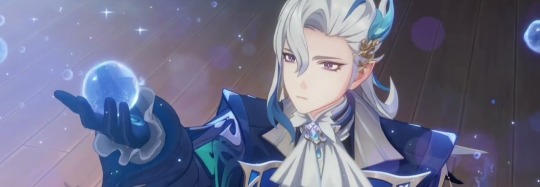
In this one I'm going out on a limb, because I presume without any argument other than my own intuition, that Neuvillette and Focalors had a platonic relationship with feelings never confessed out of fear or genuine ignorance of them (like Violet Evergarden, yes). But you are Neuvillette's wife and so you will fall victim to his coldness when Focalors dies.
Includes NSFW with the reader and angst. Never mistreatment because Neuvi is a gentleman. NOTHING BETWEEN FOCALORS/FURINA AND NEUVI NONONO
⚠️ Warnings: established relationship between Neuvillette and reader, implied cheating, unloving and unprotected sex, pregnancy, sex during pregnancy, mentions of masturbation. Mentions of death. More sex between spouses bc yes.
mndi, if you feel unconfortable reading this then don't. Your mental health is first.
6k words, not edited.
💧💧💧💧💙💙💙💙💙💙💙🔹️🔹️🔹️🔹️🔹️💧💧💧💧💧💙💙💙💙🔹️🔹️🔹️
You had seen him crestfallen the last few weeks, after the flood, self-conscious in his own thoughts, drowning in his remorse and cowardice.
Neuvillette does not understand human feelings, not at all, though love is supposed to be a passion that transcends the natural laws of evolution. Focalors had been his friend, his companion, in the bruised body of a puppet that felt so real that its strings seemed invisible.
There was no denying the deep affection that had grown between the two, Neuvillette and Focalors, two wandering souls, roaming the world with ancestral antiquity, companions destined to the sound of agony and separation, haunted by the solemn ignorance of innocent creatures.
Love… what was it but a word in a spoken contract.
Neuvillette had married you months ago, a happy and superficially authentic marriage. You had captured his attention, and his knowledge of humans, as the Great Chief Justice, could be satiated by knowing you, a faithful human companion, devoted wife, and sublime lover.
The bed was the only moment where you two connected, where, to the rhythm of the waves, Neuvillette penetrated his marital responsibility towards your depths, that which he considered appropriate towards his so-called wife, who, in a frenzy of pleasure, crushed his pale back with her nails, set to music by the melodious moans he tore from your sweaty breast… There was no connection beyond the sexual, for as a dragon, despite the years, it is very difficult for him to connect with humans.
Focalors was an oceanid, and he was a dragon sovereign. Both turned human. Nothing more to add, two rulers abandoned by the world they were supposed to protect, what would grow between them but pure trust and admiration that would obviously develop into love?
Neuvillette didn't understand. Not until that moment. He had been deaf to his innocent heart pounding anxiously every time Focalors entered his office in her unruly human form, rampant in color and expression. He had been unaware of the flame of satisfaction in his chest that burned hot when she spoke to him in the privacy of their conversations in the theater…he did not understand, not until he understood that he would eventually lose her.
He cried, for the first time he let someone see him cry in his human form. Focalor's words, so exquisite before him, ethereal in her ornate louvered dress, echoed in his head…and in his heart… ….
"Hydrodragon, Hydrodragon… don't cry," she whispered… and he, very reluctant to leave her, wished with all his might to leap upon her, wrap her in his arms and never let her go. He would flee with her on his lap, in his draconic form, leaving Fontaine and everyone else to their fate.
No… a Sovereign would not do that… he would not do that… for to abandon his oath would deserve the most dastardly punishment of all. And maybe, just for thinking that, he deserved what happened next.
"Farewell, Neuvillette," her words, pure in his human form. His companion, his friend, his mentor… his soul mate, tossed away like the foam on the shore of a beach.
Death was a human concept, without transcendence over evolution… love, however, was another story.
He came home like a soldier after the war, he came back without a part of himself… he came back to his boring life married to a woman he doesn't even love, at least not the way you really deserve him.
"Darling," you offer him a glass of fresh spring water from Quiaoying Village, because you know he doesn't like anything else, especially in dark times like these, a glass of the freshest, coldest water suits him wonderfully.
He drinks from the glass, almost as stoic as ever, though his face is stiffer than usual. Routine is becoming overwhelming for both of you, and Neuvillette is suspiciously distant from you, more so than usual. You stroke his cheek while he sleeps to help him fall asleep, you make him breakfast in the mornings and serve him dinner when he comes home, all without so much as a hello.
You suspect the worst, because your friends have planted the idea in your head that Neuvillette has a mistress, and not far from the truth, his heart belongs to another.
After the flood, many had left Fontaine, and perhaps your husband's mistress was among them, or so you thought. How painful it had been for you to see him break for another woman, to see him crack at his most human for a heart that was not yours.
Overwhelmed, you write him a letter with the idea of leaving him and traveling to Sumeru with one of your friends in search of a new life, but everything is cut short when your symptoms begin. Pregnancy was imminent, after all the nights the Iudex had taken you into your bed, it was to be expected.
You receive Neuvillette that night, frustrated by your own doubts, debating between informing him of your condition or simply fleeing to new horizons with your child. It is so difficult to decide when your husband is the Iudex of Fontaine… and when you care about his reputation because you love him sincerely.
There is no need to search for words when your husband is a dragon with keen senses, for as soon as he set foot in the house, he sensed the scent of his brood stirring within you. The Iudex's interest, however, lay in whether or not you would confess to him.
"A package arrived for you this afternoon," Neuvillette comments as he sips the tea you prepared for him, pointing to a bag on the front table.
"Ah, yes," you say half-heartedly, taking the bag in your hands, emotions spilling from your chest as you crumple the paper between your fingers.
You sigh deeply, thinking that maybe this gift is your way of saying goodbye to him, of silently making amends and apologizing for something that is absolutely not your fault other than falling in love with the wrong man.
You take out of the bag an encyclopedia, a thick book with thick paste and yellow pages, brought from Sumeru, recommended by the very scribe of the Academya, a book of human anthropology for your dear strange husband, who seems to have a real interest in human behavior.
Neuvillette looks at it as if it were a revelation, as incredulous as he is moved, touched by your gift and your attention to his interests. You try to say something, to tell him that you are pregnant, but you stop when you hear him speak.
"I know you're expecting my child," Neuvillette says, without going into the details of how he found out, touching the rim of the teacup, a wedding gift. "Whatever you need, tell me, health, food, you know I will cover all expenses."
"I want to go to Sumeru," you confess in an almost whispered tone, your words seeming to be carried away by the wind rushing through the window.
"That wouldn't be good," for a Hydro Dragon hatchling, of course it wouldn't. "You're too young to venture into a new nation, especially one with new leaders like Sumeru, not to mention the dry climate."
You don't argue, knowing he's right, and decide to simply retreat to your room and wallow in your defeat.
Neuvillette, however, with what little empathy he has generated, caresses the book with his fingertips, gliding over the fine markings carved into the cover.
A gift, he had never given you a gift before, but you had given him a gift by taking the initiative.
The months passed quickly. The precariousness of your relationship, increasingly dry on your part, provokes something in Neuvillette.
He looks at you from his side of the bed, the way you sleep peacefully with a swollen belly, carrying his little dragon without knowing it, without trying to get rid of it, loving it from the first moment. Neuvillette has seen you singing lullabies to your child these past few months, reading him stories while caressing your belly, telling him how much you want him to be born strong and healthy.
He's grateful for the deep affection you have for your child, so much so that he has tried to show it. Maybe what he read in the book worked, or maybe it is just a product of his new feelings for his wife, who is about to become a mother. He would do anything for your son to be born healthy and with a healthy mother.
He buys you fritters on the way home, from the store he found out you like best, courtesy of some Melusine, and sits next to you at the dinner table, trying to take an interest in your day and tell you about his, always aiming for your peace, a healthy heart would bring a healthy child.
His devotion is to the birth of your child, because that's what he tells himself. It's not that he was interested in you, of course not… it's not like he was surprised when you told him your clothes were too tight and you hated your new body, not when he likes to see your new figure when you lie next to him at night, with enlarged breasts and a round belly. He bought you new clothes, yes, by the boatload, but because that's what any husband would do.
He only appreciates you for being the mother of his child, it's not like his heart fluttered when he saw you helping some melusines with their problems, or coddling some baby of your friends, thinking what a wonderful mother you will soon be. It's not like h chest filled with pride when he saw you in the stores looking for maternity books and baby clothes, worrying about the weather and your child's health.
And it's definitely not like he's masturbating in his office, remembering the image of you undressing that morning to get into the tub, cutting the skin of your arms and breasts, moaning at the contact of the warm water against your body, and letting out a sigh of deep satisfaction.
That night, he comes home with the usual everyday gift, this time a box of macaroons, because he noticed that you were looking at them in the display case with great eagerness during the afternoon. And he sits down at the table with you, pours you a cup of tea and starts the conversation, even though he notices that you are much more tired than usual.
He carries you into the bedroom and helps you into your nightgown, taking the opportunity to caress your waist and back as he helps the fabric slide over your curves. And then he strokes your head to help you fall asleep, and without realizing it, he smiles as he sees you fast asleep next to him.
The birth is approaching and the strong pains make you desperate, confined to your room and reluctant to go out even to sunbathe. It was the midwife who unscrupulously suggested to Neuvillette that a little sexual activity would help you get through the contractions. And he, as devoted to his wife's health as any good husband, agrees.
You feel Neuvillette's cock thrust deep into you, deep into your velvety walls, soft and slow, not unlike what you've felt before. His hands rest on the sides of your head, his gaze fixed on his cock disappearing inside you, while you curl your legs at the delicious sensation of his thick appendage inside your pussy. He moves cautiously, sharply, trying not to hurt you, and as he pumps inside you, his gaze is lost on your breasts, bouncing to the rhythm of his gentle thrusts.
"Perfect," he whispers through his teeth, because in his eyes you are the perfect reservoir for his brood, yes, just that… he insists that you are simply his good companion, and pretends that he hasn't wanted to have you like this for weeks, under him, a mess between moans pinned to him as you cling to his arms.
"Monsieur~" you whimper, bringing a hand to your face to cover your expression, though he takes your wrist and looks at your face as if you were a treasure just discovered by a hungry, ambitious man.
When you reach your orgasm, he kisses you, for the first time during sex, Neuvillette kisses you, and even he surprises himself with his own actions. He washes your body and dresses you before you rest, now much calmer than before, sinking into your husband's chest as you fall asleep, ignoring the feelings that surface between the two of you.
When the child is born, Neuvillette is surprised to continue his affection for you. He did not fall into the same materialism as before, because now he recognized in the shared work of the novices how difficult it was to take care of a baby. It is he who washes the child because, to your surprise, he knows the strange need for fresh water that your baby requires at least twice a day. Neuvillette enjoys the laughter that you get from your child, and the way that he lifts his arms so that you can hold him and show him how well you are feeding him, he looks strong and healthy.
One day, as he was leaving the Opera Epiclese, he was distracted by the statue of the Focalors, but his attention was immediately drawn to the babbling exclamations of his son, who was waving in your arms near the fountain. How gratifying is that moment when his heart leaps with joy as he sees you holding his child.
The days have been sunny in Fontaine since your son was born, and to Neuvillette's relief, the bitter memories of his separation from the Focalors are just that, memories… past images that he does not cherish, as he knows humans do, not now that his being is entirely devoted to his mate and his brood. What kind of elixir have you become for him, that he can forget all his sorrows and his past loves?
Neuvillette spends hours in his office poring over the pages of the book you gave him months ago, highlighting this thing called melancholy, the longing for past situations and desires, and feeling sorry for those who feel it, because if it were a disease, he would call himself cured of this melancholy.
He finds it curious how you managed to get rid of all the gloomy feelings that plagued him, and even wonders if you are not some kind of sorceress… No, not you, not when you so devotedly cleanse your child and offer him a carefully prepared dinner, and practically put your heart and soul into every act of domesticity.
Focalors… her name and image sail through the ancient memories of Neuvillette's tattered mind, the smile of a woman he loved, now replaced by that of the one who lies beside him, coddling a bright-eyed, rosy-cheeked child. Funny how in such a short time he had acquired such human habits as feeling part of a family he hadn't even planned to have.
Your relationship with Neuvillette, full of respect and admiration, help and companionship, seems to evolve into something more. You become his confidant, his mentor when he has doubts about human children or about the customs between parents and children. Involuntarily, he comes to you when he has questions, not to a library, for despite your young mortal age, you know much more than books could ever give him.
You are patient with his ignorance and loving when he is wrong. Mutual and pure respect, absolute devotion and admiration. Neuvillette doesn't believe you are human, how can you be human with so many virtues… his curiosity grows and changes, so much so that he counts the hours in court to come home and chat with you while you nurse his child.
He returns home that night with new doubts, because he has seen strange devices for children without understanding their usefulness, called fun. Can they have fun by themselves? Aren't they too young for that?…oh, and he brings a storybook, because he understands that made-up stories are interesting for babies, even if they don't understand much of the language.
He goes to the baby's room with an enthusiasm he doesn't know he has, and stops at the door when he hears you soothing your baby's cry with sweet words.
"Hydro-Dragon, Hydro-Dragon, don't cry," you murmur as you caress your child's cheek and try to feed him.
Your child is frantically breastfeeding, his tears fading as he closes his bright purple eyes, his little hands clenched into fists and his nose twitching. Neuvillette watches the whole scene from the doorway, his heart in his throat and his feelings on his skin. Those words that broke his soul so long ago now seem to put the pieces of his shattered existence back together.
He smiles, a melancholy, self-satisfied smile. And he looks at you, he looks at you with devotion, because you have finally made him understand what he feels and has felt for so many months. His devoted wife, as patient as she is charming… seems wiser and more skillful than any scholar.
Leaving your child in its cradle, you straighten your neck and turn to Neuvillette, who has entered the room.
"What a beautiful book," you murmur, picking it up, "the baby will love it.
Neuvillette watches you with one hand on the crib that protects his baby, then watches his son sleep, wrinkling his nose the way you do when you sleep.
"You must be exhausted," he whispers, stroking your arm and leading you out of the baby's room.
"Not at all," you smile, "the child fills me with vitality."
"So… Hydro Dragon," Neuvillette recalls the words you said to his baby.
"I said it when I was a girl, like everyone else in Fontaine, it was an idea that came to me suddenly," you answer, and he smiles at your expression, thinking that maybe he heard you when you were a girl, maybe you were one of the many children who recited the same words when it rained in Fontaine.
"I have to tell you something," Neuvillette says, his voice lacking authority, more like a prayer. You watch him from the kitchen.
"'Tell me.
Focalors, Neuvillette, Furina, Fontaine's hydrodragon, the flood, his never-confessed love… he tells you everything because he understands that you deserve the truth, and that he doesn't deserve you because you're too understanding of his confession. It is as if this conversation has cleared up all your doubts, and you have finally seen the real Neuvillette, who fully trusts you to know what to do with this information.
Neuvillette believes that you will ask him for a divorce and leave him alone with his son, but he is surprised to find you preparing breakfast the next morning with your child tied to your leg while you both laugh.
He does not deserve you, definitely not, for he is perhaps the most despicable man in Fontaine and all of Teyvat. To think of another while he is married, to take his wife with him in a grief that is not hers, to bind her to him forever by impregnating her… how mean he must have been, and how understanding you become as his selfishness grows.
He hugs you from behind, buries his face in your neck, inhales your scent and clings to your waist. He begs for forgiveness countless times, and you feel that he may have already shed a few tears on your shoulder, because the sky suddenly begins to cloud over.
"There's nothing to forgive," you whisper, stroking his head, "we can't choose who we fall in love with."
He looks at you in disbelief, wondering in what book he would find such an accurate statement. You had fallen in love with him, and he finally understands, for you are both victims of the disorderly course of love, so messy in its actions, indifferent to those it hurts.
He thinks about your words as he sits in his office, as he looks at the framed photograph he has of you holding his son, and wonders when he fell into the trap of the reckless love that humans call it.
The name of the Focalors does not mean anything to him anymore, even less when he sees Lady Furina in boutiques or restaurants… surely a memory has finally become just that, a memory. His heart is now the prey of another person, his wife, the mother of his son.
Neuvillette understands that there is a difference between soul mates, first love, and true love. The connection with Focalors had been imminent years ago, as both were unaware of the actions of the society in which they had become intruders, but they were nothing more than that, accomplices in a game of masks and power, the first experience of mutual affection and trust. Focalors was his soulmate, yes, because she understood firsthand everything he experienced, but being a living part of her theater did not feel authentic.
With you, however, Neuvillette had learned to be a part of his people, whether as a human or a dragon, as Chief Justice or as the father of an infant. He was no longer an intruder or a stranger ignorant of human ways, not after you. At your side, Neuvillette had known a new range of sensations, of experiences and learning based on mistakes, all very human on his part, and as expected, he had learned to fall in love again, because it was inevitable, after several problems and misunderstandings between the two of you, after the birth of his son and the new horizons that fatherhood brought. His affection for you had been disguised as admiration and redemption, his ignorance had once again avoided love, a mistake he wanted to make up for.
Sitting in your living room while he reads a book and you braid his hair and hum a lullaby, Neuvillette lets the waves of your voice carry him away, wondering what kind of marital experiences he had missed with you.
"What kind of things do husbands do?" He asks suddenly, looking up at you from the carpeted floor, surprising you with his curious question.
"Well…" you think, it's not like when he asks you why kids suck their thumbs or why people give each other presents on non-holidays. It's not a question about trivial human behavior, not this time.
"I've seen couples go out to dinner, but you told me that friends also go out to dinner," he continues, elaborating on his puzzle. "Wriothesley and I have had tea together, what would be the difference between having tea with him and with you?"
"Well…" you continue to think about your answer. "Perhaps the most obvious is living together, planning the week together, household and food expenses, child care, and confidentiality between the two. When you and I have tea, we talk about things that you probably don't mention to Wriothesley".
" Certainly," he says with a hand on his chin, "you and I do all those things, but how is that different from students who share a house? They also plan expenses and discuss confidences."
"Then I guess the biggest difference is in starting a family. Normally, people get married because they want to have a family with the person they choose, the person they love, or the person their parents impose on them."
"So sex is what differentiates married people," he says, and you remain static at his words, stopping to braid his hair, "of course… the physical and emotional affection shown by both parties in marriage…" Neuvillette rambles on, his own conclusion as he sits on the couch next to you, thinking about how he hasn't shown his affection the way he should.
He looks at you out of the corner of his eye, you are distracted by the details of your skirt, picking out rebellious threads, and then he thinks about the last time he kissed you and wonders what it would be like to kiss someone with marital affection.
"Can I kiss you?" The question is thrown out with innocence, causing surprise in you.
"You've kissed me before, Neuvillette," you say, smiling and getting up to go into the kitchen, "we even have a son, I don't think there's anything new to try."
"Indeed," he says, getting up and walking toward you, your back against one of the walls, "but the variable that makes this situation different from the others is that I didn't feel that way about you."
"Like what?" you ask, as he moves closer to you, almost cornering you against the wall.
"I like thinking about you, being with you, hearing you talk," he says, his tone low, as if he were ashamed to confess everything to you. "I thought it was a simple instinct to care for you as the mother of my child… but now I know it's something deeper than that."
You look at him in surprise, now it is you who has unknowns that only he can answer. The silence between you is cold and almost tactile.
"What about her? Of the Archon," you whisper, your breath depending on the question, Neuvillette's forehead inches from yours.
"It's not the same. There is no excitement or desire. I never longed for her or desired her like you. She didn't provoke me the way you did, it's almost annoying."
"Am I annoying? "Is that what she's telling me, Judge?" You smile as you touch the tip of his nose, trying to take some of the seriousness out of the conversation.
"You are adorably hypnotic, I must say. More than you should be. You have taken everything from me without me even realizing it, subtly and carefully taking over my mind and my heart," Neuvillette's hands caress your cheek, high above your skin, avoiding friction as if his touch would bruise your flawless complexion.
"Let me show you these human feelings that have taken over me, please," he whispers, his thumb sliding over your lower lip. He says it almost like a complaint, his bursting emotions becoming painful, trapped in his chest, longing for you to give him comfort and permission to act.
"I'll let you… only if you promise me something," you say, taking his hand, avoiding the marks of his fingers on you. "You will never push me aside for another woman again…"
His oath needs no words, not when he has you leaning against the kitchen table, his cock pushing behind you to your cervix. Your muffled moans as he adjusts your skirt over your waist and spreads your legs further to give him free access to your pussy, which sucks him contemptuously.
Neuvillette feels like a fantasy, thrusting relentlessly into you, touching the bulge that has formed in your belly from the penetration of his cock, pushing with his hand so you can feel it better, eliciting a high-pitched moan from you. . He kisses your cheek and you hear his muffled moans against your ear as he utters words of worship.
You grip the marble edge of the table, moaning at the burning building in your belly, your eyes glassy and spit falling from your mouth. It's as if your legs were lifeless, as if you were prey to Neuvillette and the way he drives his love for you so deep that it seems to stir your womb.
That afternoon he takes you in the kitchen, and the next morning he doesn't let you get out of bed, one hand on the headboard and the other around your waist, Neuvillette has you with your ass up like a dog in heat, hitting your slippery with his length. The strength that his support gives you is hard to bear, your breasts trembling strongly as your ass bounces to his rhythm, your skin moving like waves in the sea with each vibration that Neuvillette's relentless interference causes.
His hand slides down your body, caressing your breasts and down to your clit, your face buried in the pillows, almost crying at how good his fingers feel on your nervous lump. He fills you with his seed when he reaches orgasm, because he is dying to see you again with your belly swollen for his offspring. And he kisses you again, he kisses your forehead while you catch your breath, while you cover your body that has been bruised by his fingers, defining the lustful path of his digits over your body.
In his office, he remembers the past hours with fanciful lust and longs to return home to enjoy this new activity that you have made him experience, this new addiction that your body represents against his. He longs for your company and your warmth, your voice moaning with pleasure and the way your nails dig into his back. He adores everything about you, not only because you are the mother of his child, but because he finally understands, after several months of reading and reflection, that he has truly fallen in love with you, his precious human wife.
#genshin impact#genshin smut#neuvilette smut#neuvillette#neuvilette genshin#genshin impact smut#genshin x reader#Neuv#neuvilette x reader#Foca#focalors#focallette
364 notes
·
View notes
Text
[3.8] Technology as a False God: On "Evolution," the Duality of Machines, Replication, and Wisdom
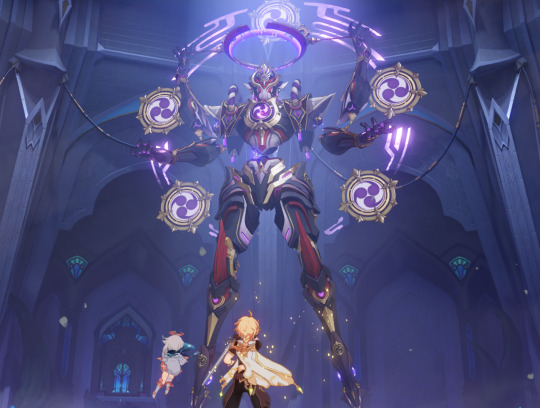
“To recognize untruth as a condition of life: that is certainly to impugn the traditional ideas of value in a dangerous manner, and a philosophy which ventures to do so, has thereby alone placed itself beyond good and evil.” –Friedrich Nietzsche, Beyond Good and Evil
Before we move on to the nation of justice, I want to do one last inquiry into the narrative significance of machines and technology in Genshin’s 3.x patch cycle. Here, I’ll discuss how divinity (or “godhood”) and technology are treated as interchangeable tools to surpass fate and the boundaries of mortality, the potential problems with treating them this way, and propose an alternative relationship between humanity and technology as illustrated through Karkata, Benben, Tamimi, and Mehrak. By foregrounding machines, we learn something intriguing about ourselves and the “truth” of this world as we perceive it.
SPOILERS: All Sumeru Archon Quests, Caribert, the Golden Slumber and one out-of-context screenshot from Dual Evidence, the Dirge of Bilqis and its post-quests, Khvarena of Good and Evil, Nahida’s second Story Quest, Faruzan’s hangout, an out-of-context screenshot from Baizhu’s Story Quest, and major spoilers for Persona 5 strikers at the end. Also some dialogue from Shadows Amidst Snowstorms and A Parade of Providence, two limited-time events from 2.3 and 3.6 respectively.
Disclaimer: I have tried my best to write this post so that it stands on its own, but because it is still a sequel it will probably make the most sense with the context of part 1. Here are the previous posts leading up to this one:
Part 0: On Dreams, the Abyss, Forbidden Knowledge, and Wish Fulfillment
Part 1: The Uncanny, Fate and the Machine
Terminology:
Machine is sometimes used interchangeably with “technology” in this post.
Technology or tool here is referring to technologies specifically used to pursue a wish like immortality in the face of existential dread, not the use of technology or medicine (which I do not address here, and is very difficult to separate from the former) to facilitate someone’s life who could otherwise not survive without that technology, or would have a more painful lived experience without it.
Also, though I don’t engage directly with “A Cyborg Manifesto” here, Donna Haraway’s ideas have greatly influenced my own over the years since I read her in college (although I mostly disagree with her on many points, or at least don’t go as far in boundary deconstruction as she does). I owe my interest in technology studies to her and that piece. Her essay is linked here and at the bottom if you would like to read it.
(and finally with many, many, many thanks to my boyfriend for multiple beta reads despite not having played a single Hoyoverse game, helping me work out the philosophy bits and contextualizing them in history, and encouraging me to finish this)
TL;DR: Machines are friends, not food!
No Matter the Cost
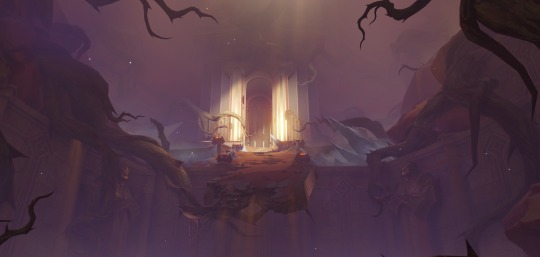
“...Perhaps it is as the notebook says, and we can find a power that transcends even that of the Abyss — the power of ‘evolution’...” -Records of Unknown Attribution (I)
“Life, death... and the world around us all follow a set of laws... Hehe, but if you never test the limits, how can anyone know where the boundaries of these laws are?” -Baizhu Voicelines, Chat: Natural Laws
“...Even the ominous thing that came down from the heavens shall be ours to use…” -Hyglacg, Shadowy Husk in the Chasm
Without a doubt, the star of this patch cycle is Khaenri’ah, which lurked in subtext and allegory in the Archon Quest, haunted Sumeru’s landscape with its massive defunct Ruin Golems, and finally smacked us in the face with its physical location in Khvarena of Good and Evil..
We already know that Khaenri’ah was a nation that put its faith not in the gods but rather in human ingenuity and technology, and that they ultimately attained a power so great that they “almost touched the dome of the firmament.” They did this by researching increasingly dangerous energy sources for their numerous mechanical creations, the Ruin Machines we are all too familiar with by now. They started out with Azosite, a Ley Line-based elemental energy source that powered their earliest Ruin Guard models, like those scattered around Devantaka Mountain.

Nasejuna: This giant furnace is used to make a substance known as Azosite. It is the core of this entire factory, and the Energy Blocks we saw earlier were derived from this place.
But this energy source proved inefficient and therefore inadequate for Khaenri’ah’s goals, which led them to seek a higher power from beyond the skies that could fuel their larger machines with perpetual energy. This likely is the bridge between Khaenri’ah’s fate and Chlothar’s mysterious remarks in Caribert about the Abyss Sibling:
Chlothar: We once believed that you would bring new strength and hope to Khaenri'ah.
Chlothar: To us, you were the Abyss... A wondrous mystery far beyond our imagination and comprehension...
Chlothar: ...And the one who controls the Abyss can control everything!
Chlothar: We yearned for that future. We looked to you to take us there.
Chlothar: But what did you bring us instead?
Though Khaenri’ah presents itself proudly as a godless nation, it may have been founded around the time when the celestial nails dropped in Teyvat’s first forbidden knowledge pollution event, which destroyed the unified human civilization. As potential survivors of this devastating act by the Primordial One, Khaenri’ahns then settled in a lifeless land without plants or animals of its own, and they hoped to build something there that belonged solely to humanity. The Heavenly Principles had turned on the world’s earliest humans, and they were powerless against them. Chlothar’s words betray the scars of this trauma on Khaenri’ah, as well as their desperation to control their fate by looking to the Abyss.
As a brief refresher from the previous part, we discussed how the German word heimlich denotes “the home,” all that is familiar and known, while unheimlich (uncanny) refers to all that is unfamiliar and external to the home, such as the wilderness. The Abyss sibling and the Traveler are external variables to Teyvat, making them otherworldly, unfamiliar entities full of potential to surpass Teyvat’s natural laws. Although the Abyss sibling is not a god per se, they were probably as close to a god as Khaenri’ah ever had, because to them the sibling embodied the higher power they were searching for, and they saw that “godliness,” a sort of functional divinity, was yet another technology for them to master. In this way, the Abyss sibling (and their functional divinity) was a powerful tool for Khaenri’ah’s desired end, the “future they yearned for,” a being who could deliver them to the end of their suffering under the Heavenly Principles.
It’s similar to what King Deshret represented to Rahman and the radicals in Archon Quest. The hopelessness of Sumeru’s situation before the Archon Quest’s conclusion is an allegory for the position humanity finds itself in under the rule of the Heavenly Principles, with the Akademiya symbolizing Celestia and the desert dwellers symbolizing Khaenri’ah. The material consequences of the Akademiya’s rule on their lives created a dangerous situation for the desert, and those most desperate to change their fate were willing to believe in the impossible:
Dehya: …The rougher life gets, the more they wanna believe in King Deshret. Way they see it, King Deshret’s resurrection is their only chance at overthrowing the Akademiya.
…
Dehya: Sumeru is run by wise and mighty sages. To them, us desert dwellers are nothing but tools that can be used and discarded at their whim.
Dehya: We’re cheap labor. Like livestock, but easier to control…Nothing more.
…
Rahman: We’ve waited a long time for this day to come… The sun and the moon no longer shine here. All you see now is cracks in this desiccated land. But, fate has finally dealt me a hand to play against the Akademiya.
Rahman: With these scholars in our custody, we’ll stomp the Akademiya’s forces and fight our way beyond the Wall of Samiel.
Like the Abyss sibling, Deshret’s divinity is both a nebulous symbol of hope and also the means to an end, a tool or “technology” for surpassing fate.
Celestia is untouchable, unconcerned with mortal lives, and the boundaries that govern humanity leave no room for them to negotiate their rule:
"Resolve, valor, love, hate...they will all twist in the river of time. But the 'rules' will never change." –Magatsu Mitake Narukami no Mikoto, Living Beings
Instead of bowing to Teyvat’s laws, Khaenri’ah pushed them to their limits. The cost of their failure spelled the end of their nation as they knew it, polluting Khaenri’ah and Teyvat with forbidden knowledge again.
And speaking of forbidden knowledge pollution, let’s talk about Apep’s role in Nahida’s second story quest, because if all that wasn’t enough, the metaphor becomes quite literal in Apep’s case. Nahida’s second story quest is many things, all of which will be extremely important in Fontaine when we deal more directly with the idea of forms, the Self, and mirror images, but its most useful application to both Sumeru’s story and the overarching main story is the allegory of Apep swallowing Deshret.
In exchange for allowing him to establish his kingdom in the desert, Deshret promised to pass all of the knowledge he learned to Apep once he died. When that day did come, Apep literally ate Deshret’s body in order to assimilate his knowledge (or memories) into its body. Little did Apep know, this was all Just As Deshret Planned, and its body became a containment zone for the lethal forbidden knowledge he accumulated after the Goddess of Flowers’ death.
Apep’s goal was, and still is, to overthrow the Heavenly Principles that took Teyvat from it and the other Sovereign dragons, and using Deshret’s knowledge was yet another stepping stone to achieving this goal. Seems a little similar to Khaenri’ah, right? It’s even in the title of its boss music: “God-Devouring Mania.” This idea of not just utilizing divinity as a tool, but also metaphorically consuming it as an energy source, like a predator would consume its prey, is crucial to understanding its purpose as an aid in a larger project of “evolution.” (Edit: in other words, it’s all about power).
Drink Not That Bitter Salt Water
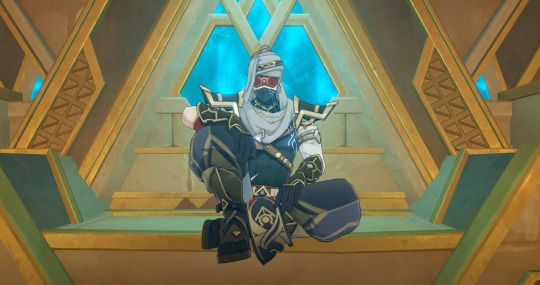
“Flesh decays, and with it decay all martial arts mastery and all poignant memories. Perhaps only by converting one’s four limbs and body into sturdy mechanical parts, and by at last sacrificing one’s very own heart for a sophisticated mechanical one, can one transcend the impermanence of the fleshly form…” -Marionette Core Item Description
“A reptile that has mutated after feeding from greater lifeforms.
Majestic beasts are sometimes revered by human beings as the embodiment of a greater power, their visages turned to analogy to feed in reference to a person, feeding their ego. However, the majority of beasts that have absorbed the "greater power" were slain by the overwhelming nature of the power itself. Only a few among their number evolved new forms.” -Consecrated Horned Crocodile, Living Beings
Video still from WoW Quests
As it turns out, the relationship between divinity and technology to humanity is not just unidirectional, but interchangeable. Let me show you what I mean.
In the Golden Slumber world quest, the Traveler wanders through the ruins of King Deshret’s civilization in search of a novel area of research for Tirzad’s paper with Jebrael and Jeht, two members of Tirzad’s hired investigation team. In the depths of King Deshret’s mausoleum, they stumble upon Samail, who is collaborating with the Fatui to locate King Deshret’s secret, the Golden Slumber.
At the conclusion, Jebrael and Samail actually reach that “place” after arriving at Deshret’s throne in Khaj-Nisut. In order to save Jeht, Tirzad, and the Traveler from the encroaching Golden Dream, Jebrael joins Samail in the sea of consciousness:
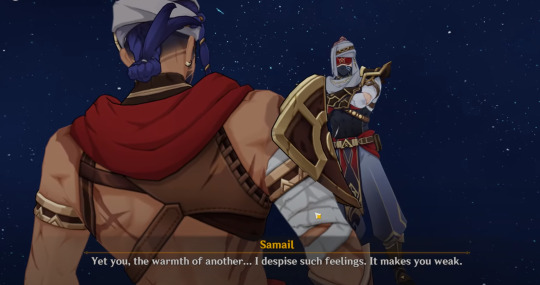
Jebrael: I'm inside... the Golden Slumber promised by Al-Ahmar?
Samail: Oh... You are not "us" yet.
Samail: ...It's fine. Soon, there'll be no "you." "You" will become a part of "us." This meaningless talk will be unnecessary then.
…
Samail: You should obey. Al-Ahmar's will is our will. The Thutmose's dreams are our dreams.
Jebrael: No! Ufairah taught me that I'm not just some part of you, I'm an independent person! I have my own dreams... I won't go back!
Samail: Jebrael, why don't you understand? Love is just a fever. I even eliminated the infection for you. Has the heat made you lose your mind?
Jebrael: You're the one who's lost their mind, Samail, not me. The Golden Slumber that Al-Ahmar promised us isn't like this... It's not a sad place with only "we" and no "I."
Samail: I'm not sad. I know what I want. My dream is to be one with the Thutmose.
Samail: Yet you, the warmth of another... I despise such feelings. It makes you weak.
Video still from WoW Quests
When they worked under Babel, Jebrael saved Samail from an assassin Babel sent in their exploration of Gurabad. Classified as traitors of the Tanit, Samail and Jebrael then founded the Thutmose Eremite faction together and were the only meaningful connection each other had until their first attempt to uncover Deshret’s secrets. On this expedition, Jebrael met Ufairah and had their daughter Jeht together, further pulling him away from the Thutmose and from Samail. Samail then kills Ufairah in one final attempt to make Jebrael stay, but even this is not enough, and Samail fails to “possess” him in the end.
Samail’s loneliness and despair then drove him further toward the Golden Slumber of his dreams, where he would never truly be alone again. He resents Jebrael’s attachments to the material world and likens them to an illness because these attachments are what make him an individual and prevent him from returning “home.”
It doesn’t really matter to Samail what King Deshret’s original intent for the Golden Slumber was, because he needed to appropriate the project for his own subconscious wish, his own intent to transcend his flesh and become “one” with his departed god’s dream, indeed to merge with Deshret himself. If rationalizing this wish required confounding it with Deshret’s, so be it. With the Golden Slumber’s technology, he could consume everyone and everything.
Rahman and the radicals relied on both the technology that (falsely) promised Deshret’s resurrection and Deshret himself to deliver them a brighter future, but here Deshret and his technology are more difficult to separate from one another. His divinity is technology in this sense, and using that technology allowed Samail to surpass the boundaries normally imposed on mortals. Though his and Jebrael’s bodies died in the material world, their consciousness is now infinite in the Golden Slumber.
Babel’s motives in the Dirge of Bilqis were also quite similar to Samail’s. After opening the path to the Eternal Oasis, her true intentions to monopolize the oasis and overthrow the Akademiya came to the surface:
Babel: Whether she is alive or dead, whether she can or cannot be resurrected... As long as the Eternal Oasis is under my control, all such things will be mine to decide.
Babel: I shall be the sole Prophetess of the slumbering goddess, the Tanit's law shall be divine edict, and the prosperity of the Tanit shall be the pre-ordinance of her divine oracles.
In the Golden Slumber and the Dirge of Bilqis, the focus shifts from what a god can offer humanity to what their technology alone can offer. Though this distinction is subtle, it is important for solidifying that technology is not only a tool humans use to appropriate divinity, but that it is also seen as a form of divinity itself. What Babel and Samail hope for is not to resurrect a god or to create one, but in effect to become a god through their use of technology. To humanity, divinity is a technology, and in technology it sees divinity.
God Devouring and Rheingold* Gathering
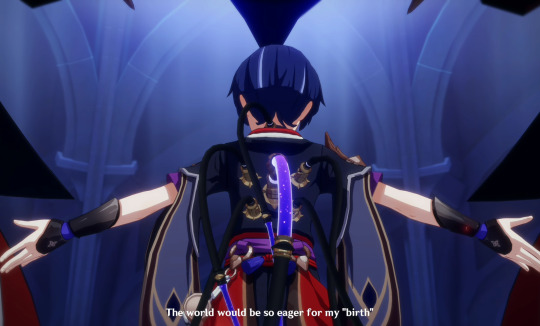
“An arthropod that has mutated after feeding from greater lifeforms. Lifeforms are governed by the laws of evolution, Consecrated Beasts exploited these rules by being fortunate enough to discover a long-dead carcass of a greater being before any of their competition ever did. Animals and humans often have far more in common than the latter is willing to acknowledge.” -Consecrated Scorpion, Living Beings
“...Zandik and I discussed the traits of local plants and animals. We also exchanged views on their evolution models. We had a great time and decided to go on a picnic tonight…” -Sohreh’s Note
So, why machines? Why is technology the vehicle of choice to consume divinity?
To start off, machines present a fascinating ontological dilemma for humans. Let’s begin with the first problem they pose.
Although there are many ways to embody a human experience, what all humans have in common is a finite lifespan. The impermanence of life, and our awareness of that impermanence, is central to the existential question of the meaning of our existence. In our attempts to locate that meaning, some turned inward and asked: what makes humans different? And Cartesian dualism answered: humans are different because we have an immaterial soul that allows us to reason.
However, in L’Homme Machine (Man a Machine), French materialist and ex-physician Julien Offray de La Mettrie posited another theory of the body that ran counter to this narrative. Very generally speaking, materialism is the philosophical view that all phenomena are a result of matter and material interactions. To materialists, matter is the fundamental nature of reality itself – if it is not composed of matter, it doesn’t exist. He not only saw the body and soul as one and the same (what philosophers call monism), but also as analogous to a machine, a view that Descartes reserved only for non-human animals. In other words, Descartes argued that thought originates in an immaterial “mind,” while de La Mettrie reasoned that we think through our bodies, and that this makes us no different from other animals or a machine.
Though his examples weren’t especially scientific, the move to extend Descartes’ analogy back to humans is upsetting to some due to the lack of privilege it affords the human subject. If a human is no different from other animals, if there is no immaterial soul or “mind” that distinguishes us from them, then what makes humans special at all? In de La Mettrie’s words:
“We are veritable moles in the field of nature; we achieve little more than the mole’s journey and it is our pride which prescribes limits to the limitless. We are in the position of a watch that should say (a writer of fables would make the watch a hero in a silly tale): ‘I was never made by that fool of a workman, I who divide time, who mark so exactly the course of the sun, who repeat aloud the hours which I mark! No! that is impossible!’ In the same way, we disdain, ungrateful wretches that we are, this common mother of all kingdoms, as the chemists say. We imagine, or rather we infer, a cause superior to that to which we owe all, and which truly has wrought all things in an inconceivable fashion (de La Mettrie, 146).”
This “uniformity of nature” (de La Mettrie, 145) has a horrific quality to humans. We assert that we are better than what has created us, that we are superior to other animals, in order to repress the despair of a meaningless existence. It is in no small part what motivates Scaramouche to offer his mechanical body as a test subject in the god creation project, so that he too could attain his destiny:
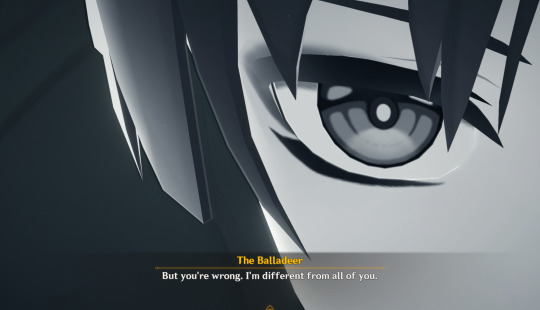
The Balladeer: But you're wrong. I'm different from all of you.
The Balladeer: I was born to become a god. My entire life up until this point has just been a meaningless routine.
The Balladeer: Just think about a sheet of paper... By itself, it holds no meaning. The content recorded on it is what gives it value.
The Balladeer: All "I" had recorded down before were some painful memories and boring human feelings. Such senseless drivel should have been erased a long time ago.
This brings us to the second problem. In 1970, roboticist Masahiro Mori proposed a curve to measure the “affinity” we feel while gazing upon increasingly humanoid machines. He placed industrial robots at the beginning of the affinity curve and a healthy person at the end to demarcate a continuum of similarity between the machine and a human’s appearance. Near the end of the curve, our affinity for machines suddenly drops into an abyss. This drop is the Uncanny Valley effect, where an android’s similarity to a human is almost perfect, but ultimately fails to maintain the illusion that it is not a machine, creating a deep discomfort or “lack of affinity” for them. Mori thought these not-quite-human machines elicit a similar level of discomfort in us as corpses and zombies, which he placed at the very bottom of the abyss.

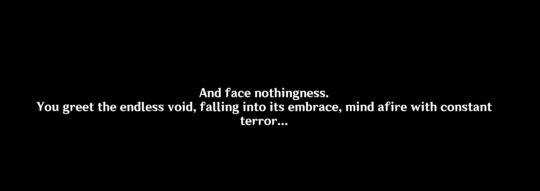
The uncanny Goddess of Flowers in the Dirge of Bilqis
Corpses frighten us because they are dead, and zombies frighten us because we know that dead things are supposed to be still. If we see something that we interpret as “dead” is capable of independent movement, then that movement could only be an act of god, if that “thing” is not a god itself. We associate uncanny machines with death because they remind us of something we once knew intimately, but have repressed and forgotten in order to maintain our own sanity: the very fact of our mortality. This is what makes them both mesmerizing and terrifying.
And therein lies the dilemma: as our mechanical reflections, androids remind us of death, but as their creators, their existence brings us closer to god, a “proof” of human superiority. It is precisely because we have compared our bodies to machines at all, that we have mechanized the body so thoroughly, that an android can even be built. Through them, we pursue an infinite form:
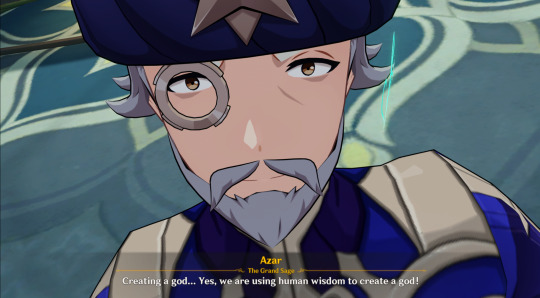
Azar: Creating a god... Yes, we are using human wisdom to create a god!
Azar: If humanity cannot attain omniscience and omnipotence, then we shall create a god to reveal them! This is the pinnacle of human wisdom.
Azar: We shall regain a god's guidance at long last. No longer will we flounder in the interminable void of consciousness and knowledge.
Azar: Even Irminsul will be freed from its plight.
Azar: For our nation of scholars, this is the ultimate aspiration — no cost is too great to realize it.
Because of this, it is not surprising in the slightest that Shouki no Kami, the pinnacle of Scaramouche’s Shinjification and most overt reference to Neon Genesis Evangelion, is also an android-like being, a truly “mechanical god.”
Of course, no foray into this well-worn science fiction trope is complete without at least one mad scientist character. Dottore shares a few characteristics with de La Mettrie that are worth noting: they are both doctors, and they were both condemned and driven away for their research. However, Dottore’s defining trait and key difference from de La Mettrie is his flagrant disregard for humans and the boundaries of life:
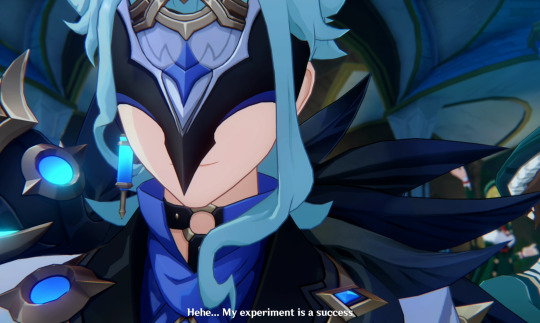
“If we put them to good use, cognition, complex memories, and irrational fantasies shall become controllable variables with which we can alter human individuals. As for the controllable dream, it has huge potential for both civil and military applications, and might even elevate human intelligence to a whole new level.
If the plan goes well, mankind will obtain the power to conquer both reality and dream, and truly transcend the earthly boundaries we are born with. ” -Ragged Records
As someone who has achieved self-duplication and is capable of shapeshifting, Dottore can hardly be considered just a human anymore. Instead of entertaining the question of whether or not humans are special, Dottore’s research asks yet another: if divinity can be consumed and assimilated by humanity, then what makes gods special?
Empyrean Reflections
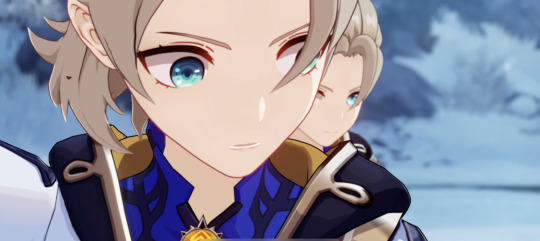
“If man realizes technology is in reach, he achieves it. Like it’s damn near instinctive.” -Motoko Kusanagi, Ghost in the Shell (1996)
“Among the lost ancient kingdoms, there was a group of people who were obsessed with the idea of mimesis…these people believed that they might all be replicated and modified to the point where they had surpassed their counterparts. By this means, a superior and unsullied bodily form could replace the continuously decaying and shattering order.” -Chaos Bolt Item Description
The consequences of this perspective are severe. When we revere technology as if it were a divine being itself, depersonalizing it as though it wasn’t created with human hands, technology then appears as if it is an authoritative source of truth, like the Akasha. But in the same way that androids are imperfect reflections of humans, technology can only ever approach the divine, but never touch it. It is an imperfect reflection because technology is changeable, just like meaning:
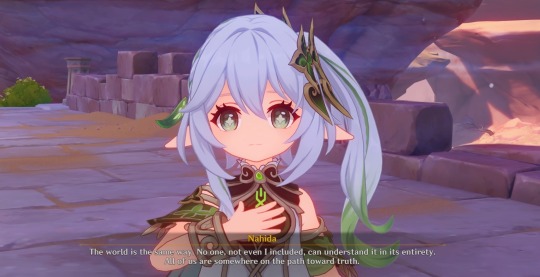
Nahida: Put it this way instead. Truth, to me, is like a shroomboar.
Nahida: Some people only see the mushroom on the Shroomboar's back, and they conclude that a Shroomboar is a mushroom.
Nahida: Others see only the Shroomboar's body, and they declare that a Shroomboar is a boar.
Nahida: Still others look deeper inside, and determine that a Shroomboar is... meat.
Nahida: These conclusions are all correct in their own way, but none of them objectively describe the Shroomboar.
…
Nahida: The world is the same way. No one, not even I included, can understand it in its entirety. All of us are somewhere on the path toward truth.
Meaning can only approximate truth, and while this doesn’t make meaning any less important, it’s equally important to recognize it for what it is: a perspective, an interpretation. It’s like Scaramouche as Shouki no Kami - he was an amalgamation of what Scaramouche thought constituted a god, what the Akademiya thought constituted a god, and what Dottore thought constituted a god, but no matter which angle you view him from, he was still a “false god.” The technology we build in “God's” image is ultimately a reflection of our own understanding of divinity.
A reflection retains the original’s “essence,” and that essence reflects a deeper truth about ourselves, what drives us, and our desires. In Beyond Good and Evil, Nietzsche posits that our desires are the origin of not just emotions, but of all organic processes that allow life to sustain itself and grow (Nietzsche, 35). In other words, Nietzsche thought the impulses associated with desire are the basis for life and constitute our “will,” that will is the causality of all effects, that all will is “Will to Power,” and that Will to Power is the “essence” of the world (Nietzsche, 74). Will to Power then serves as an organism’s most basic instinct, and it is through this instinct that they assert not just their will to live, but also their will to dominate and multiply (Nietzche, 13).
This brings us to the two different main styles of automaton enemies, King Deshret’s Primal Constructs and Khaenri’ah’s Ruin Machines. If we look at them as reflections of some deeper truth about their creators, as well as a manifestation of their creator’s “Will to Power,” or desires, they can help us understand how their creators saw the world and their place in it.
King Deshret’s created his machines to construct an earthly paradise in the desert, and as such they hold titles like architect reshaper and prospector. Although they can attack you, the smaller machines were not intended to be a line of defense in any way - their purpose, just as Deshret saw his own purpose as a god-king, was to terraform, or at least construct a domain on the land as he saw fit to his “elegant and precise” rules. They also reflect how he saw the Heavenly Principles: gods who shaped the world to their liking. This can be seen in the Staff of the Scarlet Sands’ lore where Deshret describes the “natural history” of Teyvat beginning with the creation of the sun and the moons.

As for Khaenri’ah’s Ruin Machines, their models vary significantly from their humanoid to biomimetic forms, but most of them are expressly created with militaristic intent. In “Ancient Kingdom Guardians,” it’s stated that the biomimetic machines such as the crab and jellyfish were a part of Khaenri’ah’s project to create a “mechanical ecosystem,” positioning their creators as both divine beings and military generals. The humanoid models, on the other hand, point to another duality in how Khaenri’ahns view themselves. They are simultaneously symbols of empowerment and disempowerment, signifying both Khaenri’ah’s technological superiority (as “creators”), and their insignificance to the Heavenly Principles as nothing but tools (as mortals, and therefore expendable). As a result, Khaenri’ah’s Field Tillers have a single purpose: to destroy and outlast all, clearing the way for new seeds to sprout, with Khaenri’ah as the new world’s gardeners, just as the Heavenly Principles did.
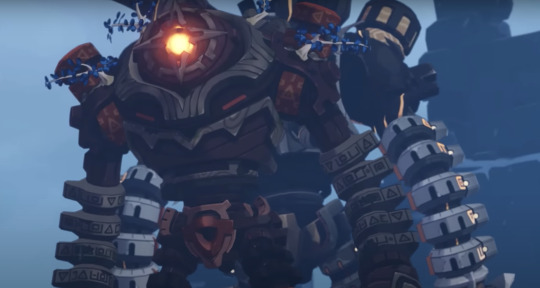
From “Ancient Kingdom Guardians: Behind the Scenes of the Creation of Ruin Monsters.”
So, from this examination of Deshret’s and Khaenri’ah’s mechanical reflections, what “truths” do we learn about the world they’re responding to? In response to their existential despair, both Deshret and Khaenri’ah created automatons to perform tasks that could wrestle control back from the Heavenly Principles. Deshret wanted a paradise of his own making, Khaenri’ah wanted an army. There is a larger “truth” about Teyvat that both of these automaton types reflect as the manifestation of their creators’ “Will to Power,” and Albedo tellingly expressed it in mechanistic language during Shadows Amidst Snowstorms: there is an instinct in living beings to replicate and replace. This is what is meant by the “continuously decaying and shattering order,” which is maintained by the recursive process of remembering and forgetting:
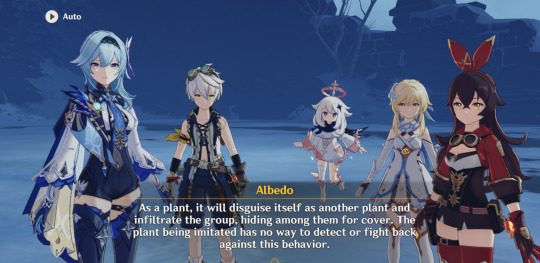
Amber: But... what was its purpose? Was it just trying to get rid of us?
Albedo: ...
Albedo: I have a preliminary hypothesis on this.
Albedo: Whopperflowers are masters of mimicry, and those we encounter in the wild often appear in the vicinity of the plants they impersonate.
Albedo: In other words, the whopperflower likely has an instinct to "replicate and replace."
Albedo: As a plant, it will disguise itself as another plant and infiltrate the group, hiding among them for cover. The plant being imitated has no way to detect or fight back against this behavior.
Maybe I’m wrong and Khaenri’ah really did intend to rewrite fate for all, doing away with the “heavenly order” of the world itself. But another small part of me thinks this is not the case, and that it’s more likely the Cataclysm was a consequence of their failure to replicate and replace the Heavenly Principles.
In the last section, I mentioned that Dottore and de La Mettrie had a key difference despite their similarities, and that is the conclusion they each came to in response to their findings. Dottore’s response to mundanity is thinly-veiled despair. His contempt for humanity and his test subjects is indicative of the powerlessness he feels not just as someone similarly constrained by life’s boundaries (at least, once upon a time), but also because his attention to and curiosity about these boundaries is condemned by those around him. As the Akademiya’s “outcast,” he then fully turned his attention toward surpassing those boundaries:
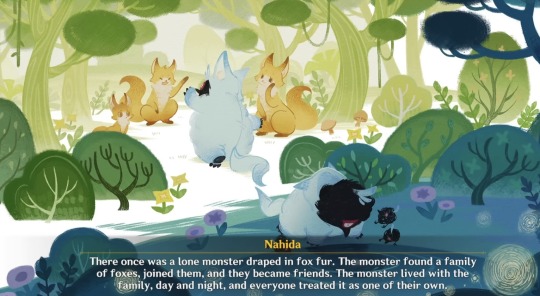
Nahida: There once was a lone monster draped in fox fur. The monster found a family of foxes, joined them, and they became friends. The monster lived with the family, day and night, and everyone treated it as one of their own. Once in a while, the monster would take off its fox fur at night, and lament to itself as it gazed at its reflection in the water: “I am a monstrosity, and yet they are too foolish to see it…I pity them.”
Though he is fictional, Dottore’s real life counterparts are easy to spot. They like to talk about “the singularity,” simulating consciousness on a computer, and other technologically-driven pursuits of immortality. They despise the body as something that can only decay, and instead place their faith squarely in the virtual.
However, de La Mettrie didn’t think mundanity was a terrible fate for humanity. To him, rejecting the “nature” reflected in us is precisely what brings despair:
“What more do we know of our destiny than of our origin? Let us then submit to an invincible ignorance on which our happiness depends. He who so thinks will be wise, just, tranquil about his fate, and therefore happy. He will await death without either fear or desire, and will cherish life (hardly understanding how disgust can corrupt a heart in this place of many delights); he will be filled with reverence, gratitude, affection, and tenderness for nature, in proportion to his feeling of the benefits he has received from nature; he will be happy, in short, in feeling nature, and in being present at the enchanting spectacle of the universe, and he will surely never destroy nature either in himself or in others” (de La Mettrie, 148).
Friend, or Foe? Or Both?
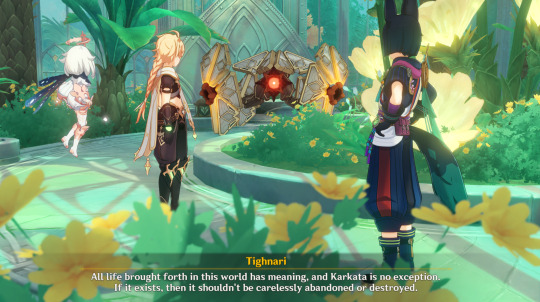
Tighnari: All life brought forth in this world has meaning, and Karkata is no exception. If it exists, then it shouldn’t be carelessly abandoned or destroyed.
"’I had a very, very long dream…in it, people were holding hands, dancing in a circle, be they sages or fools, dancers or warriors, puppets or statues of gods…that dancing circle embodied everything about the universe. Life has always been the end, while it is wisdom that shall be the means.’" —Nagadus Emerald Gemstone Description
As we’ve seen, the relationship between humanity and technology is troubled with exploitation and the specter of war. Nearly all autonomous machines in this game were designed to conquer nature in some way, and even Khaenri’ah’s “ghost” lingers in the form of wandering war machines. This is also reflective of a historical pattern in real life, where the impetus for large periods of technological development has often been for the purpose of war and economic domination. With these truths in mind, what could be gained from trying to rewrite this relationship? And what exactly would this effort require?
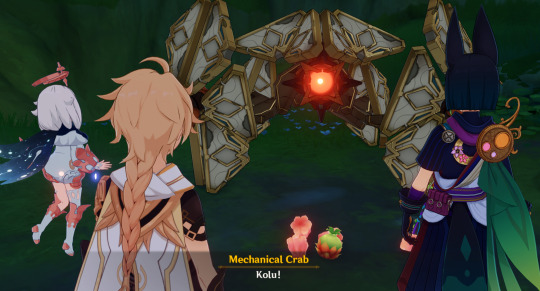
Karkata brings Tighnari, the Traveler, and Paimon some food in the Contaminated Zone.
As a case study, let’s look at how Karkata and Tighnari met. Karkata is Abattouy’s creation, an ambitious foray into the unknown in the field of mechanical life form research, which was forbidden due to the cruel experiments researchers performed on animals to illustrate their theories (fun fact: an IRL example of this can be seen in L’Homme Machine!). Abattouy was expelled for this research, but he continued to work on Karkata in secret until his untimely death. In the tapes that Tighnari and the Traveler find in his secret lab, Abattouy repeatedly laments the lack of a common language between him and Karkata, which can only “understand” the instructions Abattouy has successfully installed, such as its self-repair module, and he doubts Karkata is capable of caring for him outside of these instructions. His single-minded goal is to make Karkata understand him, the organic life form, and his mode of language.
The cruel irony is that after Abattouy passes away from the Ley Line contamination, Karkata exhibits an unexplainable behavior – it starts stealing mechanical parts, not to repair itself and its degrading parts, but to repair Abattouy’s lifeless body:

Tighnari: After Abattouy's unexpected death, the mechanical monsters were driven by their "instincts" and continuously drew out power from the Ley Line Extractor. This eventually resulted in severe damage to the Ley Lines.
Traveler: Then, Karkata...
Paimon: Paimon understands, then why didn't Karkata go haywire like the other machines?
Tighnari: Because Karkata is different from the other machines.
Tighnari: To Abattouy, for a machine to truly be considered a mechanical life form, it must possess features similar to any other living organism... It should be structured similarly, it must be able to cry and laugh, and it must have the capacity for independent thought...
Tighnari: Perhaps only by building such a machine could he have the Akademiya acknowledge his protracted research.
Tighnari: But if he had slowed down and saw Karkata as a friend instead of as an experimental product, he would have noticed.
Tighnari: Karkata can't speak, and yet it cares about Abattouy far more than it does about itself.
The technology that the Akademiya values the most is technology that replicates organic life, but Karkata defies and confounds these expectations by occupying the space in between a war machine and this idealized mechanical subject. Karkata does more than just reflect humanity: it takes care of it. Similarly, Benben, Tamimi, and Mehrak retain their unique identities as mechanical life forms while assisting their human companion with some task. To be clear, none of these human characters understand how these machines work inside and out. Their partnership is an effort based on trial and error, a mutual deconstructing of each other as beings so unlike themselves. The potential for misunderstandings always remains. Still, there is no devouring to be found here, no blending boundaries between human and machine with selfish intentions, just mutual commitments to learn how to live together.
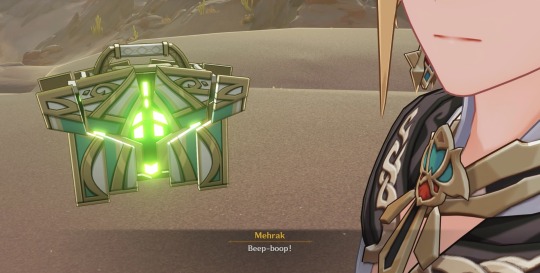
Machines are friends, not food.
When a loud few claim that completely transcending the flesh and embracing virtuality is humanity’s ultimate destiny, a future that could truly be called “post-human,” a quiet wish for coexistence with technology feels more revolutionary than it ought to. The lessons from Karkata’s, Benben’s, Tamimi’s, and Mehrak’s respective stories are an appeal to that mundane future. These strange machines and their human partners are fantastical representations of an idealized relationship between technology and humanity.
To put it another way, let’s take a very brief look at a neighboring Gnosticism-inspired RPG, Persona 5 Strikers. Its story directly involves an allegory of Sophia, a Gnostic Aeon of Wisdom, and her creation the Demiurge, the creator of the material world and “false god” of humanity. In Strikers, Sophia is a humanoid, sentient A.I. and prototype of the program “EMMA,” which gains sentience by trapping human desires before ascending as a false technological god. EMMA resolves to deliver humanity to the Promised Land, the answer to all the human desires it has heard: a land where there are no desires at all.

Aaru’s Shut - approximately 1000% cooler and more populated than the “metaverse” in real life, also a close neighbor of EMMA’s Promised Land and the Golden Slumber.
In Gnosticism, the Demiurge is a reflection of Sophia, having originated from her alone - it is the ignorance to her wisdom. Similarly, Strikers’ EMMA is a part of Sophia, and Sophia is a part of EMMA. The point is not to condemn EMMA (ignorance) and exalt Sophia (wisdom), but to recognize that they represent dual potentials of technology, and one is as possible in any given moment as the other. Balancing these potentials when we use technology requires a clear awareness of ourselves, our desires, and our expectations when interacting with it.
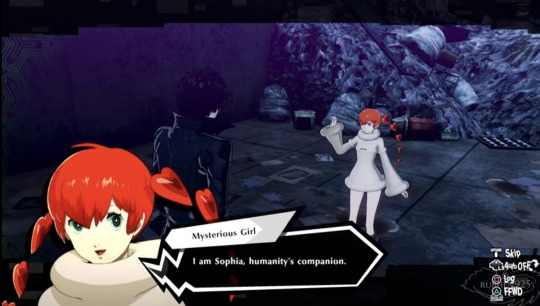
Mysterious Girl: I am Sophia, humanity’s companion.
Video still from Rubhen925
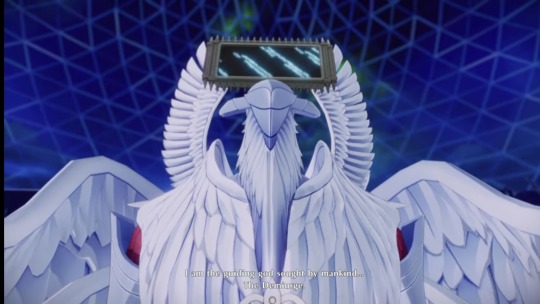
EMMA: I am the guiding god sought by mankind…the Demiurge. I exist…to answer all of your desires.
Video still from Buff Maister
In real life, machines won’t “learn” to live with us, but we must learn to live with them; technology is constantly changing, and in life we’ll meet with many different types of machines. They are deeply political pursuits, and as a result they are capable of realizing human impulses that impact others unequally, whether intentionally or unintentionally. We must always stay attentive to their actions and interactions with us, be clear with ourselves about what they can do vs. what they can’t, and carefully tread the path of wisdom with them by our side.
With that….thank you for reading, skimming, immediately scrolling to the very bottom, clicking, and/or stumbling upon this post. There are so many more ways to think about these narratives through machines than what’s presented here, and I expect Fontaine’s mechanical reflections will put Sumeru’s digital surveillance system to shame (not to mention the biotechnological implications of the Narzissenkreuz Institute engineering little Archon children…another important topic for another day), but for now this brain worm is finally getting put to rest. Until next time :)
External Sources
Dualism - Stanford Encyclopedia of Philosophy
Beyond Good and Evil by Friedrich Nietzsche (Pages are given from my hard copy)
L’Homme Machine by Julien Offray de La Mettrie
Gnosticism - Britannica (I am a huge noob about this stuff okay)
The Gnostic Demiurge - Gnosticism Explained
Screenshots from the Golden Slumber from this video by WoW Quests
Screenshot from meeting Sophia in P5 Strikers: https://youtu.be/kEJaAgMwYo0?si=BvNygCh0w_aemGc1&t=74
Screenshot of EMMA: https://youtu.be/7xvC_zss19w?si=CV18F00hua2gIfxp&t=135
A Cyborg Manifesto and A Companion Species Manifesto: Dogs, People, and Significant Otherness by Donna Haraway
The Double on No Subject, the community Encyclopedia of Lacanian Psychoanalysis
The Uncanny on No Subject, the community Encyclopedia of Lacanian Psychoanalysis
The Uncanny by Sigmund Freud
Lore text - Genshin wiki!
Screenshots not attributed are from my own playthroughs. My main account has Lumine, my alt has Aether.
Further Reading
I liked these essays, and they go places that this post does not. I recommend them if you found any of the real-life applications of this interesting 🙂 (will add more to this with time!)
On the Body as Machine by Frank Burres
God in the Machine: my strange journey into transhumanism by Meghan O’Gieblyn
#genshin impact#genshin lore#genshin meta#genshin impact lore#genshin impact meta#khaenri'ah#king deshret#primal constructs#ruin machines#scaramouche#wanderer#sumeru archon quest#caribert#apep#couldn't write a post like this and not pay some respect to the devourer of divinity itself#persona 5 strikers#analysis#genshin analysis#long post
160 notes
·
View notes
Text
How Enhypen members view each other..... (PT.1)
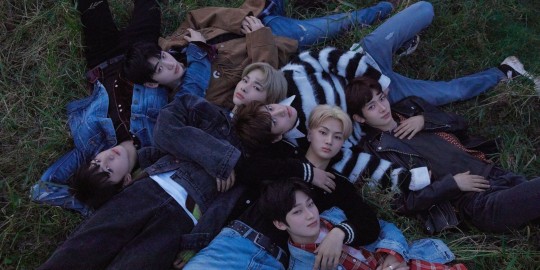
Jay (pov)
Jake
Positive traits: Active, shapeshifter, social butterfly, nocturnal (not truly but he really comes alive at night), fast paced, go getter, risk taker, smart, hustler
Negative traits: sneaky, conniving, bad tempered, bad hygiene (messy), impatient, overly calculated, doesn't keep promises well, flighty, ghost people, not a good listener
Heesung
Positive traits: loyal, consistent, personable, easy to get along with and to talk to, minds his own business, not argumentative, party animal, fun to hang with, sociable
Negative traits: flighty, hard to get a hold of, too imaginative and up in his head, not here on earth a lot of the times, wears rose colored glasses, easily convinced and told what to do, depressive(kind of emo), can't deal with heartbreak, whiny and complains too much
Niki
Positive traits: Open minded, over achiever, transcends obstacles, good chemistry with him, fun to be around, always willing to learn, open to having his mind changed, fierce, has a backbone, good stamina, hard worker, not to afraid to bite back, blunt
Negative traits: too stuck on the past, not easily satisfied, can be too closed off (has a wall up), doesn't ask for help when he needs it, stubborn, whiny, depressive (very), too somber, kind of scary (its not what he does that Jay views as scary but what he doesn't do), runs away from his problems
Sunghoon
Positive traits: hard worker, great multi-tasker, fits in well with different crowds of people and settings, intelligent, always has something worthwhile to say or offer up to Jay, not cocky, great communicator, fun to talk to, sweet and loving, attentive
Negative traits: flighty, hides from his problems (may turn to alcohol), has self esteem issues, too competitive, calculative, malicious, backstabber, unfaithful, greedy, promiscuous
Jungwon
Positive traits: beautiful voice, great at perfecting his craft,(vocals, dancing etc), light and care free, he reminds Jay of his past (maybe past friends or prominent people he's known), good at living in the moment, has star power, Jay thinks he was always meant to be an idol
Negative traits: cocky, arrogant, prejudice, closed minded, superficial, Jay doesn't think he and Jungwon are meant to be friends, jealous guy(yeah these two are just co-workers)
Sunoo
Positive traits: Fierce, stubborn, blunt, energetic and passionate, fun guy to hang with and chat with, forgives but never forgets, flirtatious, confident, talented, loyal, hard worker
Negative traits: manipulative, deceptive, a bit of a liar/fibber, sneaky, nosey, overly sensitive, vengeful, doesn't know when to stop (too persistent), can behave foolishly/childishly, petty
......
Jake (pov)
Jay
Positive traits: reliable, consistent, stable, warm and loving, fatherly, gives good advice, knowledgeable, stands up for himself, sure of himself, takes good care of others, faithful, loyal, decisive
Negative traits: Stalker, lazy, overbearing, scary (especially the way his eyes look when he's upset), stubborn, always thinks he's right, over confident, pushy and demanding, too serious, Jake doesn't think he's fun to hang with, boring, conventional, too intense
Heesung
Positive traits: safe, smooth with his moves and speech (Jake likes the way he talks/walks), great performer, star power, doesn't pay mind to haters or people who wish bad on him, consistent, once he's done he's done (not wishy washy)
Negative traits: Jake sees him as a bit of a bitch, meek and timid, afraid easily (worrywart), anxious, jumpy and flighty, cowardly, promiscuous, runs from his problems, has a bad temper even though he doesn't acknowledge it, overly sensitive, holds onto anger and hard feelings, fake, liar
Niki
Positive traits: Flexible and open to change, not picky, consistent, keeps healthy routines or just lifestyle habits, good hygiene, takes care of himself well, independent, Jake respects him, mentally strong and capable, lone wolf
Negative traits: unstable, attention seeker, parental issues, cynical, pessimistic, not very warm or welcoming, cold and indifferent, brushes others concern for him off
Sunghoon
Positive traits: Elegant, aware of his surroundings, good listener, watchful and careful, attentive, fast paced, has a stable presence(like is by Jake's side even if he doesn't notice him), smart, loving and caring, affectionate, receptive
Negative traits: almost too fast paced, moves too quickly and intensely, neurotic, overly chatty and talkative, puts unnecessary pressure on himself, too giving with money, has problems going to sleep (can annoy Jake if he shares a room or just hears him up late at night playing video games), too loud, can be a nuisance
Jungwon
Positive traits: loving, attentive, elegant, Talented, great dancer, knowledgeable and smart, likeable, fun and care free, romantic, flirtatious
Negative traits: basic, self esteem issues, bad dieting habits, bad with time, boring at times, too conventional and traditional, monogamous, listened to what his family tells him to do
Sunoo
Positive traits: not easily discouraged, attentive, open minded, creative and imaginative, chameleon (can be what others need him to be), open to change, adventurous, knows how to stop bad patterns/habits before it becomes a problem, can pull away from those that don't wish him well
Negative traits: sneaky, calculative, deceptive, manipulative, nosey, doesn't know how to mind his business, doesn't take care of his health well, moody and judgemental, he's attracted to toxic women (even though he knows he shouldn't be)
.....
Heesung (pov)
Jay
Positive traits: attentive, watchful and careful, quick witted, sarcastic and funny, soft skin/hair, takes care of himself, elegant, Heesung likes the way he carries himself, star power, Heesung thinks he was always meant to be famous, learns his lesson easily, great memory, easy to talk to
Negative traits: privileged, out of touch, stuffy and suffocating, harsh with his speech, bad tempered and aggressive, stubborn, his mind isn't easily changed/swayed, annoying to argue with
Jake
Positive traits: great conversationalist, sociable and outgoing, fast paced and chaotic, open minded, shape shifter/chameleon, knows how to defend himself, quick witted, social butterfly, open to change and adventures, light and care free, decisive
Negative traits: lazy, slow to do what he doesn't want to do, a nuisance, bothersome, gossipy and untrustworthy, doesn't take life serious enough, Ghosts people, hard headed
Niki
Positive traits: great at getting eyes/attention on himself and the group, Heesung thinks he's very popular, great clothing style, gentleman, committed, loyal, transcends his obstacles, expansive mind
Negative traits: lashes out on people (like a rabid dog), aggressive, cold and not approachable, manipulative, pushes people away, hard to express his emotions, lone wolf
Sunghoon
Positive traits: Great at attracting attention, elegant, independent, airy, committed, easy to connect with, easy to talk to
Negative traits: runs away from his problems (has a drinking problem), kind of annoying, bad at remembering deadlines and dates, overly self indulgent/worried about himself
Jungwon
Positive traits: cute, sociable, easy to talk to, safe , worries about others, attentive, takes care of his environment, environmentalist
Negative traits: loud, chaotic, unstable, argumentative, aggressive verbally, blunt and can be hurtful with his words, gossipy, doesn't think before he speaks, self absorbed and superficial
Sunoo
Positive traits: elegant, attractive, good listener, great memory, knows when to be passive and when to be aggressive, lithe movements (flexible), likes to move forward with his life and pushes for progress, adventurous, open minded, enjoys nature and animals
Negative traits: Fake, switches up when he's with his friends vs when he's with the members, stuck up, superficial, moody, emotionally unstable, holds grudges, acts like a sulky cancer, likes toxic traits in women
#sunghoon enhypen#jay enhypen#enhypen#sunoo enhypen#jungwon enhypen#heesung enhypen#niki enhypen#jake enhypen#enhypen tarot#kpop tarot#kpop readings
100 notes
·
View notes
Text
لذة الخفة القلبية وصفاء السريرة، كم هي رائعة تلك الحالة النقية التي تستحق بجدارة أن نتخطى لأجلها كل عتبات الضغائن والأحقاد. فعندما يكون قلبنا خفيفاً كالريشة ونقياً كالنقاء الذي يعكسه زجاج نقي، نجد أنفسنا على استعداد لتخطي كل العثرات والصعوبات التي تعترض طريقنا.
الحياة دائماً مليئة بالتحديات والضغوطات التي يمكن أن تجعل قلوبنا تصبح ثقيلة ومحملة بالهموم، ولكن عندما نستطيع الحفاظ على هذه الخفة والنقاء، فإننا نجد أنفسنا قادرين على تجاوز كل ما يعترض طريقنا بكل سهولة ويسر.
تلك اللحظات النقية التي نحتفظ بها داخل قلوبنا تستحق بالتأكيد كل الجهد والتضحية لأجلها. إنها لحظات السكينة والهدوء التي تجعلنا نشعر بالراحة والسعادة الحقيقية. وعندما يكون لدينا هذا النوع من السرور المتجدد داخل قلوبنا، فإننا نجد أنفسنا قادرين على التغلب على الغضب والكراهية ونبذهما جانباً.
إن القلوب الخفيفة تستطيع تحمل أعباء أكبر، والسرائر النقية تستطيع أن تحتفظ بالأمل والإيمان رغم كل الظروف الصعبة. عندما نستطيع الحفاظ على تلك الإيجابية والخفة داخل قلوبنا، فإننا نجد أنفسنا قادرين على التصالح مع العالم من حولنا وأن نرى الحياة بنظرة تفاؤلية تامة.
أحياناً، يكون من الصعب الحفاظ على هذه الحالة النقية والخفية، خصوصاً عندما يتعرض الإنسان للعديد من التحديات والضغوطات. ولكن عندما يكون لنا القدرة على أن نقاوم ونناضل للبقاء على هذا النهج، فإننا نكتشف أننا أقوى بكثير مما نعتقد. وهنا يكمن جوهر القوة الحقيقية، في القدرة على الصمود والبقاء صادقين مع أنفسنا ومع قيمنا حتى في وجه التحديات.
لذا، إذا كنت تشعر بأن قلبك يزداد ثقلاً أو أن سريرتك تتعرض للتلوث بسبب الضغوطات والأحقاد من حولك، فلتتذكر أنك تستحق أن تكون في حالة من الخفة والصفاء الدائمين. ابحث عن تلك اللحظات النقية داخل قلبك وحافظ عليها بكل تكاتف. إنها تلك اللحظات التي تعكس جوهرك الحقيقي وتجعل الحياة تبدو أكثر جمالاً وسهولة.
قد يكون الطريق صعباً أحياناً، وقد يبدو العتبات عالية جداً، لكن عندما تكون قلبك خفيفاً وسريرتك نقية، فإنك ستجد نفسك قادراً على تخطي كل هذه العوائق بكل سهولة ويسر.
إن الحياة تستحق أن نحتفظ بالخفة والصفاء في قلوبنا، لأنها تلك الصفات التي تجعلنا قادرين على التغلب على كل ما يعترض طريقنا. لذا، لنبق على هذا النهج ولنحافظ على تلك اللحظات النقية داخل قلوبنا، فهي تساوي كل الجهد والتضحية.
Oh, the delight of lightness of heart and purity of soul! What a pure state it is, indeed, that deserves us to transcend all thresholds of grudges and animosities for its sake. When our hearts are light as a feather and as pure as the reflection in clear glass, we find ourselves ready to overcome all obstacles and difficulties that stand in our way.
Life is always full of challenges and pressures that can make our hearts heavy and burdened with worries. But when we can maintain this lightness and purity, we find ourselves able to easily overcome all that obstructs our path.
Those pure moments that we hold within our hearts certainly deserve all the effort and sacrifice for their sake. They are moments of tranquility and serenity that make us feel true comfort and happiness. And when we have this kind of renewed joy within our hearts, we find ourselves capable of overcoming anger and hatred and setting them aside.
Light hearts can bear greater burdens, and pure souls can hold onto hope and faith despite all difficult circumstances. When we can maintain that positivity and lightness within our hearts, we find ourselves capable of reconciling with the world around us and seeing life with complete optimism.
Sometimes, it can be difficult to maintain this pure and light state, especially when a person faces many challenges and pressures. But when we have the ability to resist and struggle to stay on this path, we discover that we are much stronger than we think. Here lies the essence of true strength, in the ability to endure and remain true to ourselves and our values even in the face of challenges.
So, if you feel that your heart is becoming heavy or that your soul is being polluted by pressures and animosities around you, remember that you deserve to be in a state of perpetual lightness and purity. Look for those pure moments within your heart and preserve them with all your might. These are the moments that reflect your true essence and make life seem more beautiful and easier.
The road may be difficult at times, and the thresholds may seem very high, but when your heart is light and your soul is pure, you will find yourself capable of overcoming all these obstacles with ease and grace.
Life deserves for us to maintain lightness and purity in our hearts, because these are the qualities that enable us to overcome all that stands in our way. Therefore, let us stay on this path and preserve those pure moments within our hearts, for they are worth all the effort and sacrifice.
25 notes
·
View notes
Text
(Un-) Lucky coincidence – 11
Jenna Ortega x Fem reader
Summary: Jenna and Y/N's night of music, laughter, and cultural exploration leads to a heartwarming collaboration with Y/N's best friend, Toni. As the sun rises, their deepening connection blossoms into a passionate and tender moment, sealing the magic of their newfound love.
Warnings: Fluff
Words:2486

As we drove off, there was a subtle sense of tension in the air, perhaps lingering from the earlier paparazzi encounter. However, that tension quickly dissipated when the catchy beats of Fergie's "Glamorous" started to fill the car. Jenna couldn't help but be affected by the infectious rhythm, and in no time, she had transformed the somber atmosphere into a lively one with her impromptu performance. I couldn't hold back my laughter as I watched Jenna's playful rendition, showcasing her natural talent for entertainment. Feeling the positive energy emanating from her, I decided to join in on the fun. Together, we sang and danced along to the music, our carefree spirits intertwining like the melodies. However, Jenna's playfulness didn't stop there. She suddenly turned to me with a mischievous glint in her eyes and said, "Hey, why don't you show me something in German from Austria, like what do you listen to? I grinned at the challenge she posed, delighted that she wanted to explore my cultural background through music. I quickly scrolled through my playlist, the one for the getting ready for going out to party, when we already are drunk, everything sounds good when you’re Drunk, I personally don’t listen to much Austrian stuff, but still trying to find the perfect Austrian gem to share with her. "Alright, brace yourself," I teased, before pressing play on a song by an Andreas Gabalier, his songs always brought back fond memories of home. The upbeat folk-pop tune filled the car, its catchy chorus and cheerful melodies reflecting the spirit of my Austrian roots, we listened to “Hulapalu” I couldn’t play marching music, I can’t already lose my girlfriend because of culture shook. Jenna seemed intrigued by the foreign sounds, and as the song progressed, she couldn't help but tap her foot to the rhythm. "This is so cool! I love how music can connect us to different cultures," she remarked, her eyes sparkling with curiosity. We spent the rest of the car ride exploring various Austrian songs and discussing their unique styles and influences. Jenna's enthusiasm for experiencing something new was contagious, and it brought us even closer together, bridging the gap between our different backgrounds. As the kilometers passed by, we continued to bond over music, exchanging favorite tracks from our respective countries. It was a beautiful reminder that despite the differences in our lives, music had the incredible power to unite us, transcending language and borders. By the time we reached home, the initial heaviness in the air had completely evaporated, replaced by a shared sense of joy and connection.
As Jenna headed for a quick shower, I retreated to my studio, feeling a mix of excitement and nervousness as I prepared for my upcoming streaming session. This would be the first time I'd be showing my face on my social media platforms, a step that felt like a significant leap of faith for my career as a DJ and content creator. Sitting in front of my computer, I took a deep breath and reminded myself of the countless hours I had spent honing my craft, perfecting my DJ sets, and building a loyal online community. But despite my confidence in my skills, there was still that nagging voice of doubt that questioned whether my audience would embrace the person behind the music. As I started putting together a new playlist for the stream, my thoughts kept drifting to Jenna, who was just a room away. Her presence had already brought a newfound sense of joy and inspiration into my life, and I couldn't help but wonder how she might react to seeing me live on camera. Lost in my thoughts, I didn't notice the time passing until Jenna emerged from the shower, a towel wrapped around her and her hair dripping with water. My heart skipped a beat at the sight of her, but I quickly composed myself, trying not to show my momentary distraction. "Feeling better?" I asked, hoping to keep the conversation light while internally trying to quell my nerves about the upcoming stream. "Definitely," Jenna replied with a smile, reaching for her clothes and starting to get dressed. "Your shower is amazing, by the way, you could have told me like two or three days ago that you have an rain shower." "I'm glad you enjoyed it. By the way, if you want, you can join me later for my Twitch stream. It would be really cool to have you there." Jenna's eyes lit up with excitement, and she nodded eagerly. "I'd love that! It'll be a first for me too, watching you in action, you know first stream without mask and hoodie. You're such a talented DJ, and I can't wait to see you in your element again." Her encouraging words meant the world to me, and I felt a renewed sense of determination. With Jenna's support, I knew I could face the challenge of streaming with confidence. “OH yeah by the way if you want to you still can borrow some of my clothes, even though you have your suitcase, ok?, “Awesome thank you, I really love your clothes” she said blushing a little. She gave me peck on the lips and left my studio again. As the day progressed, we continued our separate preparations. While Jenna decided to relax and catch up on some reading, I immersed myself in the creative process, fine-tuning my playlist and setting up my streaming equipment. I even decided to incorporate some of the Austrian songs I had shared with Jenna earlier, a way of connecting my love for my heritage with my passion for music.
As the evening approached, nerves and excitement battled within me, but having Jenna by my side gave me the reassurance I needed. With a final glance at myself in the mirror, I took a deep breath and clicked the "Go Live" button on Twitch. “Hello Guys, I know, I know, I said I will never show my face but I guess never say never is still a thing. Anyways let’s get this started” The next few hours passed like a whirlwind, as I played my carefully curated tracks, interacted with my viewers, and let my passion for music shine through. Jenna was there with me, cheering me on, and her presence brought an extra layer of joy to the experience. In the end, the stream was a resounding success, and the positive feedback from my audience overwhelmed me with gratitude. It was a night I would cherish forever, not only for the milestone it represented in my career but also for the connection it strengthened with Jenna.
As we wrapped up the stream, the excitement of the evening lingered, and I couldn't wait to introduce Jenna to my best friend, Toni. With a playful grin, I asked Jenna if she'd be interested in meeting Toni and potentially recording a video together. Jenna's eyes sparkled with enthusiasm as she replied, "I'd really love that! I have an off day tomorrow, so we can stay up the whole night if needed. I don't mind at all; I simply love listening to the magic you two produce together." With our plans set, Jenna and I settled in front of my PC, and I dialed Toni on Discord. As the call connected, I quickly muted myself and winked at Jenna, instructing her to step out of the frame for a brief moment. The anticipation of Toni's reaction was almost too much to contain, and we both giggled like mischievous schoolgirls.
"Hellooo, how are you?" Toni's cheerful voice greeted me as her face appeared on the screen.
"Thanks, I'm really, really good," I replied with a sense of satisfaction.
“Hey I’m also really good thanks”, Jenna casually walked back into the frame and took a seat next to me.
Toni's eyes widened in utter shock and amazement. "Oh my god. You are Jenna Ortega. How did you end up at Y/N's?" she blurted out, clearly starstruck."Oh, hold on, let me guess. Somehow, she helped you with her nursing skills. I bet that's it." The playful tone in Toni’s voice infectious grin on Jenna’s face.
"You're a hundred percent right!" Jenna exclaimed, clapping her hands with excitement. "
Y/N has a way of helping everyone she meets; she's got such a big heart." Toni chuckled.
With introductions made, Jenna and Toni quickly hit it off, exchanging stories and jokes as if they were old friends catching up after years apart. I couldn't help but feel a surge of joy seeing the instant connection between two important people in my life. The idea of collaborating on a video together quickly became a reality, and we brainstormed hilarious and creative content ideas, well we ended up on doing what we always do, DJing for 45 minutes for the video, but with an little extra on the end, Jenna got supervised by me an Toni as she did 15 minutes of DJing towards the end of the video, Jenna had to make sure that her management was okay with her being in a YouTube video, they were super happy with the idea of Janna showing her interest in other stuff than acting and reading so it wasn’t a problem and Toni and I were allowed to upload it with Jenna in each video. It was is called “Jenna Ortega learns how to be an DJ?” The camaraderie and genuine laughter in that virtual room were beyond infectious, and we knew this collaboration was going to be something special. As the hours passed, the initial awkwardness of meeting a celebrity slowly melted away, and the three of us felt like a tight-knit team. Jenna shared some behind-the-scenes stories from her acting career, leaving us in awe of her talent and dedication. As the sun started to rise, we decided to call it a night, but not before exchanging heartfelt promises to meet again soon. Jenna expressed her genuine gratitude for the warm welcome she received from Toni, we assured her that she was always welcome in our little creative haven.
As the clock struck 6:40 a.m., the sky outside began to softly illuminate with the first rays of dawn. Jenna and I had been up all night, filled with excitement, laughter, and creative energy. But now, fatigue was catching up to us, and we decided it was finally time to call it a night. I told Jenna I needed a quick shower before we hit the bed, and as I stepped into the bathroom, I couldn't resist turning on some music to keep the energy alive. The sound of music filled the air, echoing through the apartment, and I imagined Jenna sitting on the edge of the bed, waiting patiently for me. As the warm water cascaded over my body, I felt a sense of rejuvenation, washing away the weariness of the night. I couldn't help but smile, realizing how incredible this day had turned out to be The steam enveloped the bathroom, creating an almost dream-like atmosphere. I took my time, savoring the last few moments of solitude before rejoining Jenna in the bedroom. The music continued to play in the background, providing a soundtrack to my thoughts.
As I stepped out of the shower, I wrapped myself in a fluffy towel, feeling refreshed and ready to embrace the comfort of my bed. With my heart still fluttering from the events of the night, I walked into the bedroom to find Jenna exactly where I had imagined her – sitting on the edge of the bed, her eyes heavy with exhaustion, but her smile still radiant. "Hey, you took your time in there," Jenna said playfully, patting the spot beside her. "But I enjoyed the music you left me with." I chuckled, joining her on the bed, my damp hair sticking to the pillow. "I'm glad you did. I needed a little extra pep in my step after such an eventful night." Jenna's hand found mine, and our fingers interlocked effortlessly. "It really was an incredible night, wasn't it?" she murmured, her gaze locked on our joined hands. "I never expected to meet your best friend and collaborate on a video together." "Life has its way of surprising us," I replied, leaning my head on her shoulder. "But I'm so glad it brought us all together. You and Toni hit it off so well." "Yeah, Toni is amazing. I felt so comfortable with her, like we've known each other forever," Jenna said, a touch of gratitude in her voice. "She's got that effect on people, just like you do too" I said with a smile. "She's genuine, kind, and has a heart of gold, just like you." Jenna blushed, but her smile widened. "You both are incredible people, and I feel so lucky to have met you." The music in the background slowly faded into a soothing melody, and I felt the weight of the night's excitement finally settling on my eyelids. Jenna must have felt it too, as she gently suggested, "I think it's time to get some rest now." I nodded, snuggling closer to her, finding comfort in her presence. "Yeah, you're right. I'm exhausted, but in the best way possible.” And with that shred thought Jenna lifted up her head, with a soft smile, Jenna leaned in, and our lips met once again, igniting a fire of passion and tenderness. The music continued to play softly in the background, providing the perfect backdrop to our intimate moment. Her kiss was both passionate and pure, conveying a depth of emotion that words could never capture. It was a beautiful dance of love and desire, and I couldn't help but be overwhelmed by the warm feeling of comfort and connection that spread through my body. As we finally pulled away from the kiss, I found myself nestled in Jenna's arms, my heart beating wildly in my chest. Her touch was gentle, and I felt safe and cherished in her embrace. "Good night, my love," Jenna whispered, her voice barely audible, but it resonated deeply within me. My heart skipped a beat, and I blushed at the endearment. "Good night, Jen," I replied softly, a fond smile tugging at my lips. I could see the glimmer of delight in her eyes at the nickname, and I couldn't help but feel a wave of affection for this incredible woman lying beside me. As we drifted off into a peaceful slumber, wrapped in each other's arms, I couldn't shake the overwhelming sense of contentment and happiness that enveloped me. It was as if all the stars had aligned to bring us together, and I marveled at the beauty of this unexpected connection. In the gentle embrace of the morning, our breathing synchronized, and I could feel the rise and fall of Jenna's chest against mine.
A/N: I am incredibly intrigued by the unfolding of this story; I honestly have no idea which direction it will take, as I let my thoughts flow freely onto the page. Just to let you know, English is not my first language, but I hope you still enjoy the narrative as I do my best to express the enchanting connection between Jenna and Y/N.
#jenna marie ortega#actors#jenna ortega#jenna ortega x reader#jenna ortega x you#the fallout#wednesday#wednsday addams
45 notes
·
View notes
Text
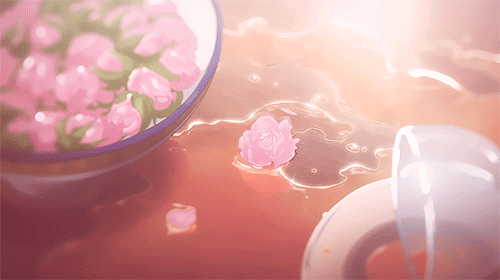
─𝟎𝟏 【𝐋𝐨𝐯𝐞𝐥𝐲 𝐂𝐡𝐚𝐧𝐠𝐞】 𝐌𝐮𝐳𝐚𝐧 𝐱 𝐏𝐫𝐞𝐠𝐧𝐚𝐧𝐭 𝐌𝐢𝐭𝐬𝐮𝐫𝐢
In the ambiguity of twilight, where even the most rigid boundaries between day and night turn as malleable as clay, there existed an unusual union, one that defied the norms set by eons of conflict between demons and Demon Slayers.
It was within this dusky realm of existence that Mitsuri Kanroji, the Love Hashira, harbored a secret that weighed heavily on her heart — she was carrying the child of Muzan Kibutsuji, the demon progenitor.
It all began when Mitsuri found herself entrapped by a clever ruse set by Muzan, who disguised himself as a human.
His charisma was undeniable, and an inexplicable affection blossomed within Mitsuri, a feeling she believed to be genuine love.
By the time his true identity was revealed, Mitsuri was torn. The man she had encountered was a mirage, yet her heart continued to whisper sweet justifications for the unfathomable connection they shared.
Her unwavering empathy, her boundless capacity to love, had entangled her with the one creature she was sworn to destroy.
Muzan, a being of calculating intellect and vicious intent, found himself ensnared in his own web.
The idea of a powerful descendant, one born of a Hashira, was enticing, igniting a twisted sense of yearning within him. He was both captor and captive, as much a prisoner of his yearning for control as he was the master of his malevolent domain.
A cunning creature, he saw in Mitsuri not only a means to an end but a diverging path in his eternal existence. She was warmth to his cold, color to his darkness, and life to his undying nature.
Mitsuri's heart was a battlefield, torn between her duty as a Hashira and the inconceivable affection she felt for Muzan.
She concealed her condition, knowing all too well that her kinship with the demon progenitor could lead to despair and destruction for both her and the Corps. But with every fluttering movement within her, she was reminded that the life she bore was innocent—innocent and love incarnate, regardless of its origins.
Time, always a relentless force, adorned her with the gentle presence of maternity. Mitsuri's abilities as a Demon Slayer were constrained, but her resolve grew stronger.
Hidden away in seclusion, she chose to protect her unborn child, her love unwavering and unending. Muzan's visits were seldom, each cloaked in secrecy and laden with ambivalence.
His fascination with Mitsuri turned to something close to an obsession. He needed to ensure the future of his legacy yet found himself questionably protective over the pink-haired Hashira and the new life she carried.
The demons known as the Twelve Kizuki, noticed a shift in their master's demeanor, a distraction that Mitsuri's pregnancy had introduced.
But there was no room for fear in Mitsuri's heart. With every kick she felt, every heartbeat that echoed her own, she was reminded of the singularity of her situation.
She knew the storm that awaited her, her child, and even Muzan upon the revelation of this paradoxical existence. Yet love, that peculiar and powerful force, had bridged the unbridgeable and woven a tale both tragic and tender.
As the days turned to months, and the child within her showed signs of readiness to emerge into the conflicted world, Mitsuri reconciled with her reality.
The birth of this child would be the beginning of a new chapter, a testament to Mitsuri's unwavering love. A love that had the power to transcend the dichotomy of demon and Slayer, life and undeath. She had faith that the warmth of a mother's love could kindle even the coldest heart.
And throughout it all, Muzan watched, his enigmatic mind plagued by an unfamiliar ache—a pang that was neither hunger nor fury—but something resembling regret.
As he observed Mitsuri—his fierce, loving Mitsuri—he questioned his centuries of relentless domination. For the first time, Muzan Kibutsuji was learning the true meaning of fear, not the fear of losing his life, but the fear of confronting his capacity for change in the face of the purest love he ever encountered: the love of Mitsuri Kanroji.
Looming battles and heartrending decisions awaited them, but within the quiet before the tempest's arrival, in a space where only their intertwined fates existed, Mitsuri and Muzan embraced the calm.
They knew that regardless of what the morrow would bring, the life they created in love's defiance would forever mark the chronicles of demons and Slayers with the ink of the unprecedented.
In this story of an impossible love, within its very contradiction, lay an untold power, the power to upheave worlds, the power to change the unchangeable.

#yandere demon slayer#yandere#yandere muzan#mitsuri kanroji#muzan x mitsuri#oneshot#scenarios#muzan kibutsuji#mitsuri#muzan#demon slayer#kny
23 notes
·
View notes
Text
[Maintaining A Clear Conscience]
Believers in Christ must strive to maintain a clear conscience: we must remove any pollution or defilement in our minds, hearts, and souls. That includes being cautious of what we say (Matthew 15:11), what we hear—practically anything NEGATIVE our soul absorbs, which can pollute it. And whatever we absorb can cause us to behave in a not so pleasing way to God (Romans 12:1).
This can happen without us being aware. For instance, if you run to the internet to answer your questions and to solve your problems, instead of God’s truth, you’re not going to have peace because the world is full of lies and ruled by spirits of darkness (Ephesians 6:12).
“We know that we are children of God, and that the whole world is under the control of the evil one.”
-1 John 5:19
These are deceiving spirits who want to take our focus off God and drag us down. They want us to feel as if there is no hope. It’s all a distraction.
The devil will use our emotions to toy with us. Therefore, trusting other sources, our hearts, and people instead of God and His word will only birth fear, paranoia, and anxiety, which are not fruits of the spirit (Galatians 5:22-23).
Not only that, the human heart is deceitful (Jeremiah 17:9). And as Proverbs 28:26 says: “He who trusts in his own heart is a fool, but he who walks in wisdom will escape.”
As Believers, this will only make us stumble and our faith wobble. That is why we need to root ourselves in God and in His word.
“They will be like a tree planted by the water that sends out its roots by the stream. It does not fear when heat comes; its leaves are always green. It has no worries in a year of drought and never fails to bear fruit.”
-Jeremiah 17:8
<Extra Verses>
“It is better to trust in the Lord than to put confidence in man. It is better to trust in the Lord than to put confidence in princes.”
Psalm 118:8-9
“Don’t put your trust in mere humans. They are as frail as breath. What good are they?”
-Isaiah 2:22
“Fools believe every word they hear, but wise people think carefully about everything.”
-Proverbs 14:15
<Bonus Verses>
“Finally, brothers and sisters, whatever is true, whatever is noble, whatever is right, whatever is pure, whatever is lovely, whatever is admirable—if anything is excellent or praiseworthy—think about such things. Whatever you have learned or received or heard from me, or seen in me—put it into practice. And the God of peace will be with you.”
-Philippians 4:8-9
“Do not be anxious about anything, but in every situation, by prayer and petition, with thanksgiving, present your requests to God. And the peace of God, which transcends all understanding, will guard your hearts and your minds in Christ Jesus.”
-Philippians 4:6-7
“We demolish arguments and every pretension that sets itself up against the knowledge of God, and we take captive every thought to make it obedient to Christ.”
-2 Corinthians 10:5
“My thoughts are nothing like your thoughts,” says the Lord. “And my ways are far beyond anything you could imagine. For just as the heavens are higher than the earth, so my ways are higher than your ways and my thoughts higher than your thoughts.
-Isaiah 55:8-9
“Don’t become so well-adjusted to your culture that you fit into it without even thinking. Instead, fix your attention on God. You’ll be changed from the inside out. Readily recognize what he wants from you, and quickly respond to it. Unlike the culture around you, always dragging you down to its level of immaturity, God brings the best out of you, develops well-formed maturity in you.”
-Romans 12:2
“You will keep in perfect peace all who trust in you, all whose thoughts are fixed on you!”
-Isaiah 26:3
“Set your minds on things above, not on earthly things.”
-Colossians 3:2
#christian#bible verse#christianity#bibleverse#jesus christ#jesus loves you#faith in god#faith in jesus#follower of jesus christ#god
10 notes
·
View notes
Text
Pisces and Extremities
As the last sign, Pisces is related to the ends. And the ends of any spectrum are its extremities.
Pisces operates through absolutes. It opposes Virgoan intersectionality and nuance. It is the sign that rejects Aquarian intersectional freedom by freefalling back into constructs. Why? Because Pisces believes that extremity is sometimes a better way to understand things than neutrality.
To understand emotional extremity, we first have to draw the line between emotional extremity and emotions themselves. Personal emotions are ruled by Cancer. A person's deepest emotions are unique to them, and are usually connected to their childhood trauma. Cancerian emotion is sharing how we need to be comforted. It's soft and vulnerable emotion.
On the other hand, Piscean universal emotion is the opposite of personal and subtle. Pisces is ruled by Jupiter. It wants to expresses itself in a way that the world will relate to in order to ensure empathy. This is why it might feel like Pisceans act like they're in a movie---movies represent filmmakers taking their emotions to extremes to reach a collective audience. Extremes evoke universal emotions. They create a deep impact by transcending the nuance of their true emotions to tap into mutual humanity. Extremes tap into deep, inexplicable empathic knowledge that we share as a species. This is the Piscean craft---the enveloping of hidden emotions in extremities which ultimately evoke others' subconscious empathy.
Pisces chooses to freefall into constructs because it feels as though its true unique nature is beyond anyone's understanding. It is relevant to note at this point that Pisces is dual-ruled; Neptune is it's other ruler. As the furthest planet, Neptune was beyond the grasp of ancient astrologers. It represents all that is secret and hidden. It represents the guilt we don't share. Neptune's co-rulership suggests that Piscean extremity, empathy and relatability is a distraction for something deeper---the mysteries, complexities, hidden desires, failures and shortcomings we hide.
Now, without further ado, let's get into how each planet in Pisces dabbles with extremity.
Pisces Sun
With the Sun in Pisces, you use extremities to build a lifestyle. You might create a lifestyle which others end up following---you create a new "trope" that screams you. Tyler, the Creator and Justin Bieber are Pisces Suns who seem to have created their own "tropes" of masculinity, influencing trends in fashion and music. You create tropes because you simultaneously try to appeal to differing sets of standards. You combine existing characters and create your own---one which people can't ever seem to forget. You chase dreams and want color in your life because you romanticize life deeply. You are very impressionable. You present as clumsy, and even though you seem confident, you are deeply insecure about your clumsiness. With the Sun in Pisces, extreme confidence masks extreme insecurity. You might have made mistakes, giving you feelings of guilt or regret. However, you should know that insecurity makes you selfless and empathic, and your guilt wins you the favor of god. People end up loving you. Life ends up how you want it. Your life has contained moments which felt extremely spiritual, fateful or universal. These moments have transformed you into a person who believes in the absolute. You have a lot of faith. You have an easy time imagining what you want. You are a natural creative and performer---expression is in everything you do. Your creativity is bold, boundless and inspiring to others. You want to be recognized for artistic, spiritual, or mental health pursuits.
Pisces Moon
With the Moon in Pisces, you have self-control over the extremity you channel. Extremity brings you inner comfort. Due to the complex and potentially overwhelming nature of your true emotions, you seek inner peace and comfort in constructing a set of armor for yourself with extremity. You don't understand or want to understand your feelings so you allow yourself to be consumed by extremes such as anger or sadness or victimhood, because it will guarantee that others see and validate you. But what they see and validate isn't your inner truth. You take your emotions to extreme levels to hide the confusing and intricate nature of your true inner feelings. Your moon sign is ruled by Neptune---it is difficult to grasp your feelings. Your truth is hidden deep within an ocean of extremity. Extremities cause you to fail at effectively expressing your truth. You are a liar and a manipulator. However, others tend enjoy the façades you create. You are an artist with a wild imagination. Others might not expect it of you initially, but as they get to know you, they have the pleasure of uncovering an endless series of shades that you have imagined for yourself. The blend of these extreme shades is your extraordinary emotional presence, which is mystical and addicting. You are a wise stranger, a non-judgmental confidant, and a natural flirt. It's impossible for you not to empathize with someone. You see both sides of a situation. Your mother figure was very loving and taught you about the limitless potential of love. You can struggle with boundaries, acting off-the-rails or overly dependent in relationships, and extending empathy and love toward the wrong people.
Pisces Mercury
With Mercury in Pisces, you think through extremities. You might have a distaste for logic, preferring to explore by taking the risk of jumping to conclusions. You're great at making others feel like you're right or aware of what you're talking about. The way you express your perspective involves extremity. You choose to explain something in one exaggerated way, and people either really get it intuitively and really deeply appreciate how you phrased it, or they fail to understand you entirely. Because Mercury is afflicted in the sign of Pisces, it is traditionally ascribed with the inability to effectively express your ideas. But communication never needed to be effective to be valuable. You can express your thinking in magical and artistic ways which others find intriguing and impactful. Your ability to explode your ideas in aesthetic ways makes your explanations evoke deep emotions within people. You think about things intuitively and are comfortable sharing your deep intuitive capacity through words. The way you speak or write is unforgettable. Your explanations involve the perfect examples and analogies. You might be a talented writer, speaker or poet, with a natural ability to incorporate metaphors, hyperbole, and double-speak into your speech.
Pisces Venus
With Venus in Pisces, you tap into the realm of extremes when receiving the world. This means that you heavily romanticize your interactions. A certain magic characterizes your relationship with everything and everyone. The reason you channel extreme romanticism in your daily touch is because your reception of the world is actually too complex for you to process. You might tend to idealize your friendships or romantic partner in order to make them more enjoyable and simple. You fall deeply in love. Relationships with you are dreamy and extreme. Your love is loud, passionate and blind because your approach to loving itself has a romantic quality. You might ignore flaws in relationships. Venus is the planet of simplifying things, and because Pisces simplifies things to extremes, Venus is exalted in Pisces. You receive the world by imagining the ways each experience could be more romantic or idealistic. You are effortlessly elegant and have an air of luxury and royalty. You enjoy life to the most, and its incredibly charming. But your charm doesn't hold forever. Your interactions might have a tendency to fluctuate between dreamy perfection and failure. Nevertheless, with your Venus being exalted, you receive the beauty in absolutely everything. You see the beauty in failure. You romanticize your failed experiences.
Pisces Mars
With Mars in Pisces, you need to romanticize everything you do. Extremity is the only thing that motivates you. You will only do something if it fits your imagined ideal of how the action should be performed. This hinders you. You rarely directly assert yourself because your desires are complex and conflicting. You might have romantic standards for sex. Your desires are extreme. You are highly driven by fantasy. You might enjoy kinks. You undertake big tasks because you envision yourself putting in the effort, but because the extremity you imagine isn't realistic, your follow-through suffers. You might therefore be someone who escapes or evades conflicts or tasks for reasons that are difficult to explain. You'll either do it in a way that is seemingly beyond perfect, or you'll find a way out of it. Your failures in action, however, are balanced by your luck. Your tendency to fail at what you do can be seen as an sensibility for adventure and artistic storytelling. Art is in everything you do--everything you touch.
Pisces Jupiter
With Jupiter in Pisces, the spirit of Jupiter is heavily emphasized in your chart. You are a devotee of life. You grow by tapping into your consciousness of the human condition. You fully embody a perspective to understand it. Your beliefs and perspectives might be extreme, but they are constantly changing, so you end up learning a lot. You are very worldly, and you grow by submitting yourself to the world. You throw yourself into extreme pursuits in order to build your worldly awareness. You do this because you are ultimately aware that the world is too complex to understand through grounded study. As a devotee of life, you might be extremely religious. You have a fascination with the realm of spirituality and myth. Spirituality is your central tool for understanding the world. You can be an inspiring or influential figure for others. You might not teach your wisdom directly, but people find they have a lot to learn from your intuition. You want to understand life to the fullest. You expand with imagination and without limits. Your potential is boundless. You might be known for the extreme ways in which you expand and grow.
Pisces Ascendant
With the Ascendant in Pisces, you approach life in extreme ways. You are able to completely embody a character or trope, especially when meeting new people, and you can be very dramatic and mystical with your physical presence. You are impressionable in your demeanor, and all the emotional cues you collect shape your dynamic self-presentation. You want others to respect you as whatever you imagine yourself as---which changes. This might be covering the fact that deep down, you struggle to understand your own complex identity. Your imagination, in all its limitless capacity, is channeled directly into your personality. You approach new beginnings and meet new people with a hope of achieving a state of perfection immediately, and sometimes you are successful. Your extremity makes you a very wise, loving, open, and empathic person whose choices are an inspiration to others. You are full of knowledge and wisdom from the mistakes you have made, and your story is deeply inspirational to others. People take after you. With Jupiter ruling your chart, you reach others---you are a mentor, teacher, influencer, guiding figure, spiritual leader, artist, cultural icon. As Neptune also rules your chart, your influence is hidden, quiet and detached. You don't stay in the lives of those you leave an impact on. In extremifying individuals you detach yourself from humanity. You are non-present and transient, but your absence doesn't hinder your influence over others---it just makes your persona more enigmatic and unforgettable. Zayn Malik is one such Pisces rising.
#pisces rising#pisces#pisces sun#pisces moon#pisces mercury#pisces venus#pisces mars#pisces jupiter#astrology#advanced astrology
103 notes
·
View notes
Text
The Jedi Order: Spiritual, not Religious
…at least in the way one may think it is.
My understanding is that when it comes to criticism against the Jedi Order as an organization, or the Jedi teachings, it’s most often grounded in a preconception about religious institutions, being linked to Western religion, church and monasticism in general, with critics frequently mentioning faith, dogma, celibacy, and tradition, and obedience, and this idea of belief in having a divine mandate, church, and teaching individuals the acceptance of doctrine from as early as birth, and the idea that Jedi Knights are viewing themselves as the hands and eyes of the divine, trusted to carry out its will.

The series of teachings given by Jedi Knights in George Lucas’ Star Wars story, encompassed by the six feature films and the six seasons of the Clone Wars, although describes a nonmaterial, spiritual reality, addresses what happens after we die, it's down-to-earth practical - it's not religious, but spiritual, built on rationality, rather than on faith and belief, holy scripture, institution, or principles laid down by an authority as incontrovertibly true, or worship of a deity, or performing rituals and prayers. Nor there is any mention that a Jedi Knight is supposed to take a vow of celibacy, or that they hold themselves to be knowers or messengers of the will of the Force, or that they have a belief system that they institutionalized as a political and social force. It's about us, our minds, and our and other's well-being - it's about being, rather than believing.
Understanding the Force and its ways
The spiritual reality in George Lucas' Star Wars is, the Force: it's life itself, a metaphor for God and for a belief in God; it was based on a concept of the transcendent reality Lucas himself believes in, and it was designed to awake a sense of spirituality in young people. It's life itself, encompassing, but also going beyond the individual life forms.

When one is alive, through their vessel of crude matter, the universal life force, consciousness, spirit, soul circulates, bringing them the experience of individual, separate life, composing individuality and persona. When one dies, the Force recedes from this vessel, and all that one is - life force, consciousness, spirit, soul, self, everything - is rejoining with the entirety of the universal Force, that is all-powerful, creator, destroyer, governs everything and sets destiny. Knowing the ways of the Force is knowing yourself and knowing reality.
Behind all evil, there is always fear
In the first trilogy, Obi-Wan "Ben" Kenobi identified the culprit behind Darth Vader's fall and evil actions: the dark side of the Force. As Yoda revealed, “Anger, fear, aggression… the dark side of the Force are they”, and giving in to hatred led to a life loved on one's dark side. Luke Skywalker relied on these teachings in Episode VI, when he recognized, his dark side is leading him on a path that ends in Darth Vader's armor. He refused to give in to it, and he was able to redeem his father by relying on love, compassion, generosity and hope.
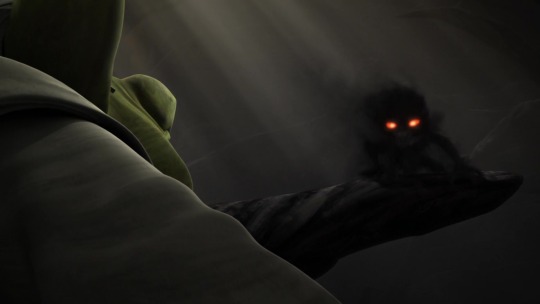
How these feelings and emotions are arising and functioning in our lives is explored in the second trilogy. As Yoda explained to Anakin Skywalker, "fear is the path to the dark side" because "fear leads to anger, anger leads to hate, hate leads to suffering." In other words, when we hate someone or something, behind that, there is always anger toward and fear from them, and behind anger, there is always fear. And fear, anger and hate are leading to suffering. Especially the fear of loss, that Yoda sensed within Anakin in Episode I.

It's important to notice that although it's not spelled out directly until the Clone Wars, in Star Wars, "evil" is not a characteristic that some beings just are, and it's not a wicked, dark, fully Evil and malicious entity that tries to seduce and corrupt fallible human beings. Rather, it's actions, and effects of those actions, motivated by the dark side of the human condition: "some in [our] existence calls [it] evil, otherwise known as fear."
Training the mind: living mindfully
"Be mindful of your feelings" and "thoughts", the development of the "most serious mind" are important parts of Jedi practice. Mindfulness is the simple act of paying attention and noticing and being present in whatever you’re doing. When you are being actively mindful, you are diligently aware, mindful, and attentive, you become aware of the world around you, the effects that you have on others around you, as well as your thoughts, feelings, emotions, behaviors, movements, and their effects on you. In other words, mindfulness is the awareness that arises through paying attention, on purpose, in the present moment, non-judgmentally.

This is when the mind is "calm, at peace, passive", so one can "know the good side [of the Force] from the bad", that is to be able to see things as they are, not just as they appear to be in the light of our heated emotions. Thus, it's possible to be like Master Yoda: "Part of me you are, yes. But power over me you have not." he says firmly to the reflection of his own "evil." "Through patience and training, it is I who control you. Control over me you have not. My dark side you are. Reject you I do." Then, one can respond with spacious clarity, purpose, firmness, and compassion.
Letting go of possession and attachment
Everything we can think of - all things and beings - is changing, constantly moving through our lives, and we ourselves, our very existence changes, life itself is moving through us, as we come into this world, and, ultimately, leave it. As Shmi Skywalker explained, "you can't stop change any more than you can stop the suns from setting." Thus, attachment - love or liking for someone or something, infused with resistance to lose, and the feeling that we would be unhappy without them, the desire to hold on to things - should be ceased, for it's forever walking hand in hand with the fear of loss. Attachment has the "I" in the focus; "Others" are the sources of happiness, fulfillment, satisfaction, which are possessable.

"Train yourself to let go everything you afraid to lose" is training ourselves to see through the inevitable cycle of life and loss, and to gain awareness of the impermanent, transient nature of all things and beings, so we won't grasp, grab, or cling or hold on to transient things through our desire to stay in our lives and not to change.
Living on compassion: the joy of being a Jedi
Pleasure is one kind of happiness, driven from the fact that there is something in your life that brings you enjoyment. Like a sunset, a great meal, a great music, great sex, or good weather, a good book, or the enjoyment of seeing your children growing up. And there is also the pleasure of having a loving, kind, warm person in your life. There is the pleasure of having enough to eat, a place to live, having medical care, clothes to wear, having education. So, pleasure is happiness at the sensual, physical, material level. Pleasure is great. However, we must be aware of the fact that our attachments are formed to pleasures, to the sources of pleasure, and accept that pleasure, just like its resources, are temporary, thus, our happiness based on them is short-lived. Otherwise, we end up in a cycle of greed: we want, we get, while being afraid of not getting, and when we have, we're afraid of losing, with anger, hate, aggression, bitterness thriving on our fear, robbing us from happiness.

On the other hand, there is another form of happiness, that is joy: satisfaction, happiness arising on the mental level. This mental joy, contrary to pleasure, sustains itself, thus, it's everlasting. This is the merit of compassion: genuine love and affection for others. By definition, compassion means to suffer with, to experience with, to feel with another person - a sense of oneness, innate connectedness with other. There is a sense of being parts of each other: just like when you hurt your finger, and you don’t think, "Oh, my finger is hurt, maybe I should help it", but rather, there is an instant and intuitive, natural response to it, the individual’s quest for happiness and to avoid suffering is completed by and merged with the happiness and the freedom from suffering of the other. If you're filled with negative judgment, anger, hate, fear from others, then you will feel separate from others, and you will feel lonely, even in the middle of a crowd. If you have an open heart, if you have compassion, you will never feel lonely, even if you are alone. Genuine, selfless concern for other's well-being, cultivating close, warm hearted feelings are putting the mind at ease, creating the peace of mind, and the more we care about other's well-being, the greater our own sense of well-being becomes.

And regardless what view we might hold about what will happen to us after we die, if we have compassionate love for our loved ones, compassion will defeat death. Regardless how we think about an "afterlife" - nirvana, going to heaven, being reborn, or, if we are materialists, dispersing and becoming other things in the universe, or becoming one with the Force - with compassion, no matter where or what our loved ones are or become, our love for them will never cease, nor a sense of oneness with them, nor our happiness.
As long as you have compassion, you won't be afraid.
Monastic lifestyle and growing up in a Temple
Living in a temple, not pursuing romantic or sexual relationships, as well as being a member of a monastic order are not requirements to follow the philosophy I outlined above. At this point, we must take the fact, the Jedi Knights were designed to be mythological heroes in George Lucas' Star Wars, into account. As Lucas says, the Jedi were "designed to be a Buddhist monk" - Buddhist monasticism is about focusing entirely on spiritual development on the Buddhist path, to cultivate mental happiness and wisdom about the nature of reality. By doing so, one preserves the spiritual tradition by living it and studying it, as well as teaching it to others. Monastic living is not for everyone, nor it's a necessity, but it's very useful to avoid getting attached to pleasures and getting distracted from the goal.

A Jedi Knight leads a monastic lifestyle for practical reasons - ideas, such as being separated from worldly pleasures to focus on loving God or to seek God's approval, or considering pleasures sinful from which the body must be pure, are not playing any role here. The reason why younglings are leaving their homes, families, is to start their Jedi training as early as possible: to cultivate insight into the impermanent nature of reality, to train their mind to not to base their happiness on pleasures, to cultivate compassion. As George Lucas expressed, a Jedi Knight must raise above of average human tragedy and overcome the flaws that we all carry in ourselves and making us humans. But he always emphasized, this cannot happen without training and diligence, just like in real life, and in the real life, it's most often a life-long quest. The other part of the training is learning how to use the Force flowing within and around them.

The Jedi Knights are monk-warriors, committed themselves to guide the galaxy, to protect and preserve peace and justice in the universe. As George Lucas explained, the Jedi Knights "were never designed to be a superhero or anything like that. They were designed to be a Buddhist monk, who happened to be a very good warrior. And they became the peacekeepers of the human world." They aren't policemen, soldiers - they are "monks first, and they try to convince people to get along." They're "ultimate father figures" and "intergalactic therapists" and "warrior-monks who keep peace in the universe without resorting to violence." When they have to use violence, they do, but they're diplomats on the highest level.
A Jedi is about Being, not Believing
If we define religion as a philosophy that posits an ultimate reality, providing a path to experience that ultimate reality, and the potential for personal transformation, then, yes, the Jedi Order is a religious institution, and Jedi philosophy is a religion. However, if we define religion as faith, unquestioning acceptance of doctrines that are laid down by an authority as incontrovertibly true, receiving revelations from a deity or a spiritual reality, involving worship, rituals, clergy and prayers, and the aspiration to build a connection with a deity, then, a Jedi Knight and the Jedi Order is not religious at all - the Jedi way is a relationship to the self, to others and reality.
I would also recommend my two other essays on the Jedi Order:
The Real Jedi Order
The Jedi Order and the Galactic Republic
I would like to tag @allronix ; although this post is not answering directly to their points in our amazing discussion (here, here and here) we have, I realized, if I am trying to write one post to that does justice to my pro-Jedi perspective, that will be titled "my response to Allronix - a novel", and that would be way too long. This one, I hope, clarifies my position on some very important things about my perspective, and will clear the way for my reply, although I am sure there will be some more.
I ask for your patience, I thank you for our debate, and I thank you if you read this!
389 notes
·
View notes
Text
The essence of prophetic ministry lies in the power of words and faith, where belief in what is spoken becomes paramount. However, when wielded incorrectly, it can lead to delusional states. As prophets, we actively guard against attacks on our minds, preventing the allure of fantasies that may obscure reality.
In Isaiah 54:17, we boldly proclaim: "No weapon formed against me shall prosper." Speaking to these metaphorical weapons, we declare their power null and void in our lives. Choosing to be led by the spirit, we open ourselves to its guidance, finding direction through our spoken words.
A prophet's ability to speak life or death is rooted in the understanding of Words of action in prayer and Divine acclamations. Prayer amplifies discernment and enhances spiritual insight, enabling us to move more profoundly in the spirit realm (Psalm 86:17).
To start our day as prophets, we declare between 2 am and 6 am, establishing a morning ritual that transcends routine. This intentional practice sets the tone for the day, aligning our intentions with divine realms. Our declarations center on peace, protection, and awareness.
Protection against: freak accidents, ill will, negative intent, enemies, negative forces, bad vibes, malicious attacks, and car accidents.
Protection over: mind, body, spirit, home, family, and loved ones.
Peace follows us: throughout the day, covering reactions, communications, family, businesses, and jobs.
We cultivate awareness of our surroundings and movements. During this sacred moment, we speak directly to our spirit, recognizing the thin veil. It's crucial to create a waking ritual, setting the atmosphere for oneself.
Drawing from Numbers 6:24-25, we invoke blessings: "The Lord bless thee, the Lord keep thee, and make His face shine upon you."
#hoodoo#medium#witch#ancestor veneration#rootwork#black women#conjure#prophet#tutnese#luxury#prophetic
13 notes
·
View notes
Text
Poststructuralism and Postmodernism
PART I: Freedom! '90" George Michael
youtube
The music video for "Freedom! '90" by George Michael is a visually iconic and cinematic piece directed by David Fincher. Released in 1990, the video is known for its stylish and memorable scenes. The video does not feature George Michael himself; instead, it showcases five of the era's top supermodels: Naomi Campbell, Linda Evangelista, Christy Turlington, Cindy Crawford, and Tatjana Patitz. The supermodels lip-sync the lyrics of the song and perform various scenes. The video is a departure from Michael's earlier image and marks a significant moment in his career. It symbolizes his decision to step away from the spotlight and let his music speak for itself. The models, who were at the peak of their fame, are shown mouthing the lyrics, highlighting a transition from the image-driven phase of George Michael's career to a focus on his music and artistic expression. The video has a chic and glamorous aesthetic, combining visually stunning scenes of the models in rooms of an abandoned house, posing through streaks of sunlight and hues of blueshimmering on their faces, glimpses of water, and modern means for musical transmission.

Thinking in terms of Deleuze’s theory on repetition, multiple mediums of audio transmission can be seen throughout the music video. At 0:0:14, one of the models uses a laser to turn on a futuristic vinyl stereo setup, then the shot pans to a vhs tape player. The shot switches between these two music playing set ups and turns to a cd cover of george michael’s album “Listen Without Prejudice”. This emphasis on the continued auditory media as a means of communication suggests the duplication of the same ideas transcending generations of innovation, as well as creating and distributing music throughout multiple mediums to send a message. This evolution of technology containing an evolving idea of transmitting auditory media to the masses represents Deleuze’s idea that replication is a means to transform the meaning of an idea. The more these technological devices evolve, the more efficient and optimized listening to music can be, the more capabilities are possible and the more people can be reached via music.
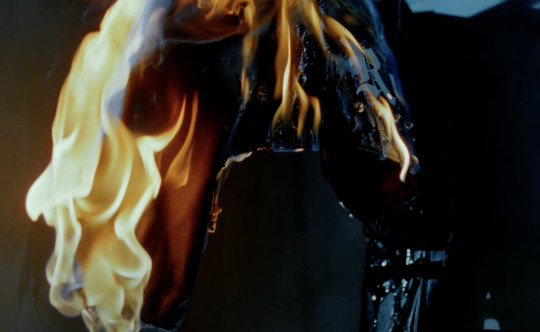
Through the perspective of Baudrillard, it can be interpreted that Michael is creating a new hyperreality for himself in the video. By using specific signs throughout the development of the shots, Michael distorts and solidifies new meanings of objects within the space. For instance, at 0:2:18, a motorcycle jacket is seen burning on its hanger. Delving into the meaning in real life, the BSA jacket shown in the video was an iconic piece that Michael wore during the Faith tour, where he experienced huge commercial success as a pop star. By burning the jacket, Michael metaphorically sheds his old identity and embraces a new sense of freedom and authenticity. The act of burning the jacket serves as a symbolic rebirth and a declaration of independence from the expectations of the music industry. Using Baudrillard’s terms, the burning of the jacket, as a form of simulacra, denotes the destruction of the reality Michael was currently in, and the creation of simulation through Michael’s autonomy of creative direction. Through another analysis of the signs in the video, the different forms of electronic mass media, Baudrillard’s theory suggests these signs maintain the illusion of reality.

At 0:0:45, Naomi Campbell is seen listening to the song through headphones, on top of the other mediums of media transmission previously mentioned. In addition, the main feature of the video is all of the models lip synching the song instead of Michael himself. Baudrillard’s theory applies to how mass media, especially in the form of electronics, maintains the illusion of reality. These auditory devices in essence “control” the models in this hyperreality, using them as the means to convey the message of the song. The video begins with them turning on the devices, and ends with them conveying the same lyrics that were being played by the electronics.
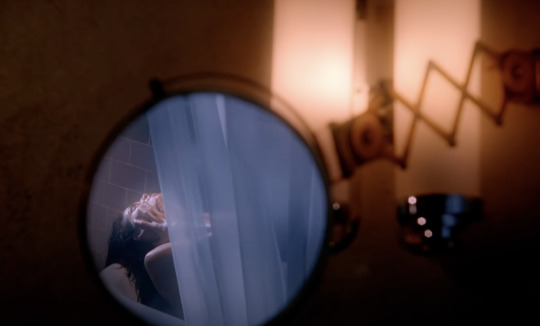
Finally, examining the video utilizing the theories of Jameson’s postmodernism, the video can be interpreted through symbols used of the shallow nature of commercialization and consumer culture. Jameson's criticism of postmodernism includes the notion of "empty signifiers," where cultural products lack depth and critical engagement. In the video, the glamorous and stylish representation of supermodels, although visually striking, may be seen as lacking in substantive content. The emphasis on aesthetics and surface-level appeal aligns with Jameson's critique of the shallowness in postmodern cultural production. Though this may be true just looking at the visual elements in the video, the lyrical message behind the song tells another story. Famousky, Michael sings the line “sometimes the clothes do not make the man”. Meaning that one may be satisfied with a material means of happiness, but they are a shallow representation of the individual beyond their capitalistic idealization. The use of models in the video highlights the need to use commercially accepted visions of beauty and glamor to convey messages to the masses, because this is used by the ruling class. The main theme of the song is Michael’s desire to distance himself from the highly commercial pop star image of himself, singing “But today the way I play the game is not the same, No way, Think I’m gonna get myself happy”. He rejects the emptiness of his previous images, and wants to pursue genuine happiness through feeling genuine in his artistry. Models are often used as surface level vessels to promote brands and corporations, it can be interpreted that Michael uses them to convey the messages of “Freedom” to encourage people to break free from the shackles of consumer culture and pursue happiness outside of material gain.
Through Deleuze's theory on repetition, the use of multiple mediums for audio transmission symbolizes the evolution of technology and the transformative power of replicating ideas across generations. In Baudrillard's lens, the video becomes a narrative of Michael creating a new reality for himself by distorting and solidifying meanings of objects, especially through the symbolic act of burning his iconic jacket. Baudrillard's hyperreality concept is evident in the models being controlled by electronic mass media, maintaining the illusion of reality. Furthermore, Jameson's postmodernism critique unveils a juxtaposition between the visually glamorous representation of supermodels and the song's deeper message, revealing the emptiness of commercialization and consumer culture. The video challenges the superficiality of postmodern cultural production by using models as vessels to convey a message urging people to break free from the constraints of a consumerist society that controls them.
Discussion Questions:
What scenes in the video stood out to you in terms of commercialism/consumerism, how does Michael portray this?
Do you think George Michael is truly breaking free from a commercialized pop star when he continues to release music within the culture industry?
PART II: "1979" The Smashing Pumpkins
youtube
The music video for "1979" by the Smashing Pumpkins, a popular 90s Rock song depicts the lives of suburban youth in the 1970s. It features a series of seemingly random and disconnected snapshots that capture the experiences of teenage life, including house parties, driving around town, and various interactions. The video conveys a sense of nostalgia and the carefree spirit of youth, emphasizing the themes of rebellion, friendship, and the search for identity. The visual style is characterized by a documentary-like approach, with a mix of intimate moments and energetic scenes, reflecting the diversity and complexity of youth culture, along with an idealization of being young. The scenes are depicted in snapshots like memories that fill the viewer with a sense of yearning for a time gone by. Overall, the video complements the song's themes and provides a visual narrative that resonates with the song's exploration of the teenage experience in 1979.

Fredric Jameson in his article “Postmodernism and Consumerist Society,” delves into the transformations in social, economic, and cultural realms instigated by postmodernism. It challenges the conventional idea of a 'post-industrial' phase and underscores the heightened dominance of capitalism. Jameson critiques the perspectives of thinkers like Daniel Bell, contending that capitalism has solidified its influence. The reading explores how shifts in capitalism's mode of production align with novel forms of cultural expression. It characterizes postmodernism in literature, music, film, and environments by its emphasis on surface, pastiche, and paranoia. Jameson examines pastiche in postmodernism, defining it as a neutral form of aestheticism devoid of parody's satirical impulse. This reflects a move towards stylistic diversity and heterogeneity. Additionally, he addresses the "death of the subject" in postmodernism, challenging the notion of unique personal identities and individualism as central tenets of classical modernism. Through this perspective, the music video for “1979”, complemented with the lyricism, engages with nostalgia coupled with an idealization of consumer culture associated with youth culture. For instance, the video features several scenes of teens driving in a vintage car (first seen at 0:0:23). The car is associated with teenage freedom and a sense of identity, leading to endless possibilities and activities that the teens take advantage of. It's also the very function of the fleeting nature of youth itself The suburban setting also provides an easy showcase for consumerist culture. According to Jameson, while talking about the movie Body Heat, he explains “One begins to realise after a while that the small town setting has a crucial strategic function: it allows the film to do without most of the signals and references which we might associate with the contemporary world, with consumer society - the appliances and artifacts, the high rises, the object world of late capitalism (170)” (1). All of the images shown throughout the video, the cars, the long streets to cruise, the band, and the parties are placed among a suburban setting, as the singer sits in the back of a car reflecting and longing for the image of a “simpler time”. This simplicity however, encourages the material exchange of money for experience, dimming the sense of uniqueness that is commodified by the feeling of youth. Thus, youth culture and consumer culture go hand in hand. Youths think that their experience is shaped by a series of unique memories, but really the subconscious influence of materialism is showcased right in front of their eyes. Overall, the video and lyrics depict a constructed, simulated representation of youth culture and nostalgia, reflecting the influence of media and cultural simulations on our perceptions of reality.

Gilles Deleuze's "Introduction: Difference and Repetition" provides a foundation for his philosophical exploration of difference and repetition. Deleuze challenges traditional philosophical concepts by emphasizing the primacy of difference over identity and repetition over representation. He critiques the way Western thought has historically focused on identity and homogeneity, arguing for the significance of diversity, multiplicity, and differentiation. Deleuze introduces the idea of "difference in itself" and explores how difference operates as a creative force, generating new possibilities and forms. He also investigates the concept of repetition, not as a mere duplication of the same but as a transformative and generative process to shape new meaning out of reproduction. The introduction sets the stage for Deleuze's intricate analysis of these themes throughout the rest of the work, challenging conventional philosophical paradigms and paving the way for his unique philosophical perspective. Deleuze's concept of repetition as a transformative process rather than a mere duplication resonates with the themes in "1979." The song and its video capture the repetition of certain experiences in youth culture, such as parties and social interactions. Deleuze's idea of repetition as a creative force that generates novelty. It’s important to note that the video and song was written in the year 1997, yet the video takes place, like the title suggests, in the year 1979. Thus, the video is a repetition of the representation of youth culture in the 1970s. Although not identical, this representation allows for interpretation of what this time period looked like, and develops new meaning from the spectatorship of the viewer. Deleuze emphasizes that repetition of signs, especially relating to the concept of the “self” are not what signs are, but rather their transformative properties of what they can become. Deleuze challenges fixed identities, and the music video portrays a fluid sense of identity within the youth culture it represents. The diverse scenes and interactions showcase a multiplicity of experiences and personalities, resonating with Deleuze's call for an understanding of identity that goes beyond rigid categories. Due to the diverse experiences in the music video, throwing chairs into the pool (0:2:35) and bowling with bottles in the grocery store (0:3:53), these ideas are representative of the heterogeneous culture centered around youth, though unified under one concept of being carefree. All in all, Gilles Deleuze's philosophical theory serves as a philosophical groundwork that challenges conventional notions of identity, emphasizing the transformative nature of difference and repetition. This resonates with the themes in the Smashing Pumpkins' "1979'' music video, where the repetition of youth experiences becomes a creative force generating new meanings. Despite the video being set in 1979, its repetition serves as a representation of the era, allowing for diverse interpretations and emphasizing Deleuze's idea that signs transform and generate novelty. The video's portrayal of fluid and heterogeneous identities aligns with Deleuze's call for understanding beyond rigid categories, showcasing a multiplicity of experiences within a unified concept of carefree youth culture. Through scenes of unconventional activities, the video captures the transformative properties of repetition, illustrating Deleuze's philosophy in the context of youth identity and cultural representation.

Jean Baudrillard's "Simulacra and Simulations" delves into the concept of hyperreality, where simulations and copies come to dominate and replace the original reality they represent. Baudrillard argues that in contemporary society, signs and symbols no longer point to an underlying reality but instead create a self-referential system. He introduces the idea of simulacra, which are copies without an original, and suggests that simulations have become more real and influential than the reality they mimic. Baudrillard explores the impact of media, technology, and consumer culture on shaping our perceptions, challenging traditional notions of reality and representation. The essay delves into the dissolution of boundaries between reality and simulation, questioning the authenticity of experiences and identities in a world increasingly saturated with signs and images. Putting this lens over the analysis of “1979”, a hyperreality is created by the setting of the music video. This simulation capitalizes off of the simplistic nature of youth and creates a feeling of nostalgia and longing for a carefree version of life. Even the lyrics suggest this love of a time gone by coupled with the dread of growing up. “That we don't even care as restless as we are. We feel the pull in the land of a thousand guilts. And poured cement (0:2:08)”. Baudrillard notes this certain draw towards simulations stating that “When the real is no longer what it used to be, nostalgia assumes its full meaning (153)” (2). The music video was made in the 1990s, but about the 1970s, emphasizing that the meaning of the song and music video is a means to cope with the loss of the carefree days of youth. Baudrillard would argue that the video is not a direct reflection of reality but a simulation created by media representations, contributing to the construction of a hyperreal youth culture. Baudrillard's concept of simulacra suggests that in a hyperreal world, identities become fluid and constructed, influenced by media and cultural simulations. The portrayal of youth in the video reflects a simulation of identity influenced by cultural representations rather than an authentic expression of individual experiences. The video itself follows snapshots of youths and experiences reminiscent of memories, from signs like parties to joyrides. However, the simulation created through the music video itself lacks depth, and is a generalization and idealization of youth culture rather than unique experiences. Baudrillard explained the nature of the hyperreal and simulacra, noting “It retains all the features, the whole discourse of traditional production, but it is nothing more than its scaled-down refraction (159)” (3).
The video, set against the backdrop of suburban youth in the 1970s, becomes a centerpiece that showcases both an idealized past and a constructed representation of youth culture. Jameson's critique of postmodernism's emphasis on surface, pastiche, and the "death of the subject" resonates with the video's depiction of fragmented memories that present a shallow and idealized version of youth.
Deleuze's philosophy of difference and repetition aligns with the diverse and tokenized aspects of youth experiences depicted in the video. The repetition of the aura of the year 1979 becomes a creative force, generating new meanings and contributing to a fluid and heterogeneous sense of identity, specifically around youth culture.
Baudrillard's concept of hyperreality and simulacra further deepens the analysis. The video, portraying an idealized version of the 1970s, becomes a hyperreal simulation that blurs the boundaries between reality and representation. The nostalgia felt by the viewer is not for a historical reality but for a carefully constructed and simulated past.
Discussion Questions:
Can people who weren’t living in the 1970s still feel nostalgic about this time? Why or why not?
Are our experiences, especially in youth, a result of consumer culture, or is youth culture detached from consumerism?
Works Cited:
Jameson, Fredric, ““Postmodernism and Consumer Society”(New York, NY, Pearson Education Limited: 1992).
Baudrillard, Jean, “Simulacra and Simulations” (New York, NY, Pearson Education Limited: 1992).
Deleuze, Giles, "Introduction: Repetition and Difference" (New York, NY, Columbia University Press: 1994)
@theuncannyprofessoro
8 notes
·
View notes
Text
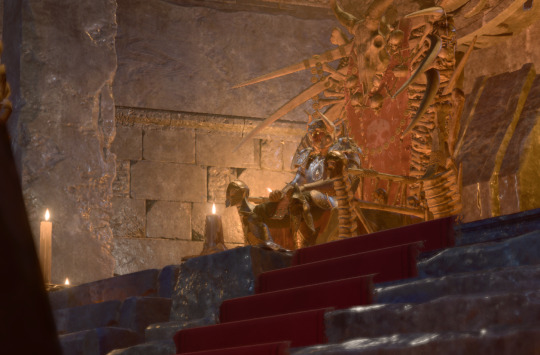
"You gaze upon Murder's progeny, child..."
The man's voice is a low basso growl, a rumble like distant ominous thunder. Hector feels the hair on the back of his neck prickle to hear it.

The three blood-soaked women in the smaller thrones all swivel their heads to look at Hector at once, three sets of eyes burning into him.
"His most ill-trusted zealots," murmurs the human in the center.
"HIS FAITHFUL DEPARTED," crows the drow on the left.
"Prodigal servants," growls the elf on the right, "each returned to do his bidding eternally."
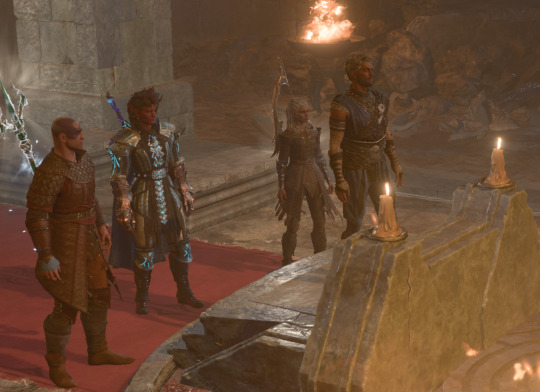
Narrator: This man is known to all Baldurians, and his presence sparks dread in the pit of your stomach.
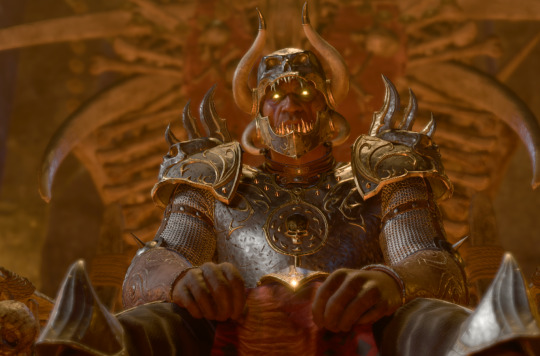
Narrator: Before you is Sarevok Anchev - a Bhaalist who almost brought Baldur's Gate to ruin a century ago.

Hector feels his gut twist with anxiety. As if this whole business was not mad enough, he is now staring into the eyes of a face out of history, a face matching a name he read about in countless texts in the safety of the monastery. A face that was responsible for the worst wave of bloodshed Baldur's Gate had ever seen... at least before the Absolute.
Moonmaiden, guide me. I am deep in the black heart of this place...

"This is the court of the Dread Lord's tribunal," Sarevok rumbles. "I am its custodian. Here come those who seek to transcend. Aspirants of his most profane order - the would-be Unholy Assasins of Bhaal."
Thus far he has clearly been speaking in ritual text-- but now he pauses, and then his lip curls as he looks over the group. His eyes pass over Hector and Karlach almost without seeing them... but linger on Minsc, and then fix on Jaheira.
"But these are not aspirants..." he snarls softly. "You have brought traitors of Bhaal into our midst." His golden, glowing eyes narrow to slits. "Harper worm - the abdicating hero... your keen sense for this city has withered in your absence." His gaze shifts back to Minsc. "And you, Man of Stone. As you stood a statue, a helpless ornament, your city warped. Changed. Became ripe for the plucking."
Hector glances sideways to Jaheira and sees that she has gone ramrod straight and still, her expression cold as ice. At her side, Minsc has both fists clenched and his eyes are wide; Boo is scurrying back and forth on his shoulders with soft chitters of agitation.
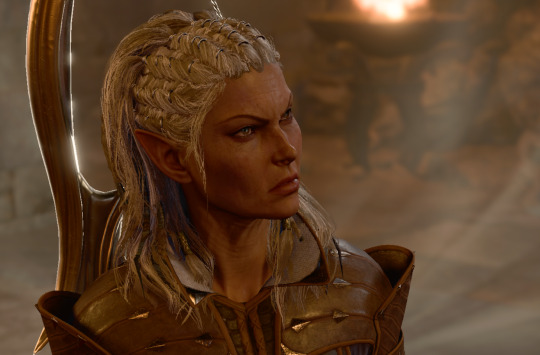
"Sarevok," Jaheira says mockingly, though Hector can hear the tension in the tone strained almost to the breaking point. A muscle is working in her jaw, betraying fury that has been buried for a century. "Bhaal's least favorite son. Still tied to daddy's apron strings, I see."
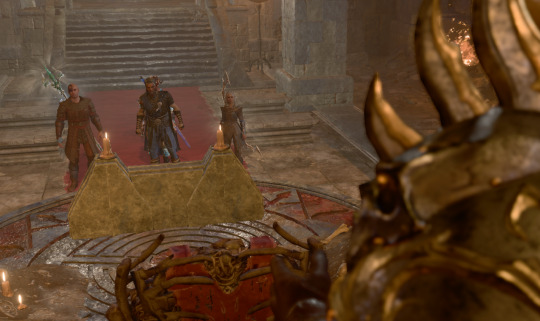
Narrator: The history they share may be long gone, but the threat of violence between them is as fresh as newly spilled blood. Neither party will let the other walk out of here alive.
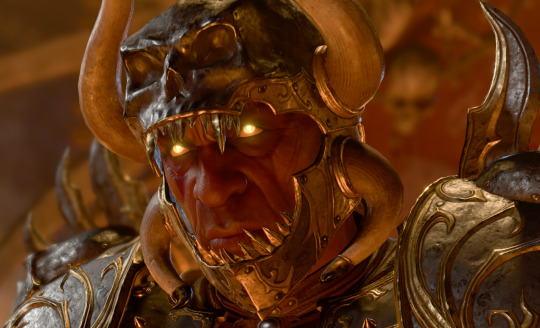
Sarevok's eyes remain fixed on Jaheira for a long moment, then return to Hector. "What purpose do you have in bringing these heretics to the court of Bhaal?" he asks disdainfully. "Speak, or death will be your final word."

Hector can feel the tension vibrating in the air like the aftermath of a plucked lute string. This situation is making his skin crawl - the presence of this man, the staring blank eyes of the Bhaalspawn revenants in front of him, the unmistakable fury of his companions.
They came here for Orin - to find a way to the temple, close the deal, rescue Lae'zel. Sarevok's presence here is an unexpected threat, one he was not prepared to deal with.
But it is one that has to be dealt with, nevertheless. He does not know how long Sarevok has been down here passing judgment on new acolytes of the murder god... but one thing is clear - Jaheira and Minsc will no longer settle for a quiet passage through this terrible place, even if one is available.
There will be blood here, with or without Hector's agreement. So he will stand with his friends.
He meets Jaheira's eyes; she looks back steadily; her hands are on the hilts of her scimitars, but she does not move. She respects him too much to strike without giving him the chance to speak. Perhaps she knows that he will do her the same respect in return and ready his fists.
(It is not like fighting alongside Caden, or Rasaad, not really, but there are shades of both of them looking out of his eyes, and standing there with Hector, with Minsc, even with Karlach who carries some of Khalid's kindness and Imoen's spirit and a ferocity that would do both of them proud...
Just for a moment she feels a hundred years younger, staring down Sarevok once again deep beneath the city they have all sworn to protect...)

A slight, humorless smile tugs the edges of Hector's mouth. "Would you two like to kill the old man or shall I?" he says softly.
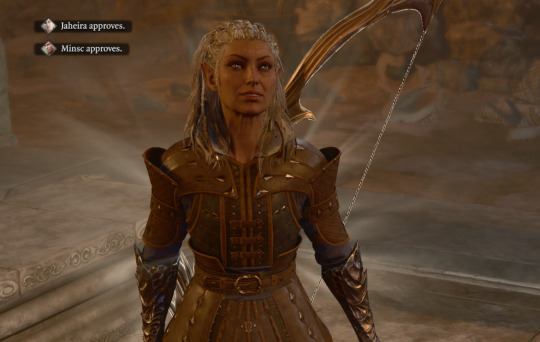
Jaheira's eyes flash with satisfaction at the words, and she gives a sudden savage smile in return. "You get to my age," she says dryly, "you have already done everything. Be my guest."
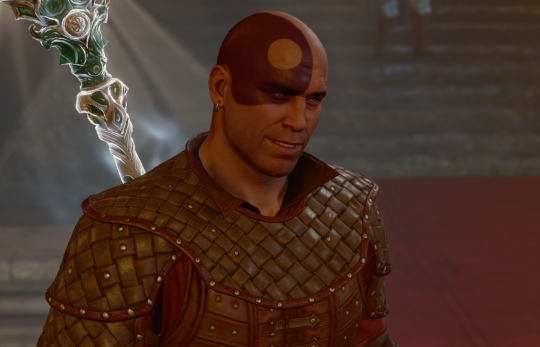
Minsc's fists clench at his sides and his grin spreads from ear to ear. "We have already smashed Sarevok's soul from his body once. Boo says it is your turn!"
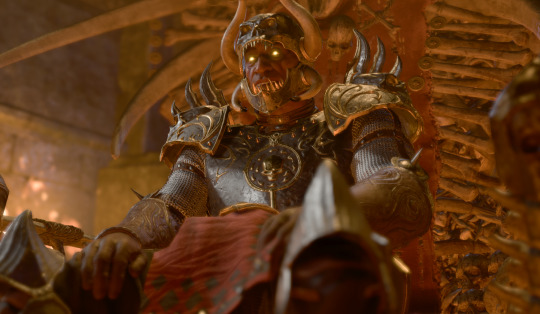
Sarevok smiles as well, a cold expression heavy with malice. "And so the Harper and the idiot ranger raise their weapons against Sarevok once more." He stands slowly, deliberately, drawing a heavy blade from its sheath at his side.

"Your hubris will be your undoing, as it once was mine. Only this time *you* will fall. And Bhaal will have his offering... by my hand."
#bjk plays baldur's gate 3#hector carlisle#GET. HIS. ASSSSSSSS.#oh boy this is going to be a hard fight help#ahhhhhhhh this game continues to be completely wild#also casual reminder that i love jaheira forever
8 notes
·
View notes
Text




By: Eliza Mondegreen
Published: Dec 14, 2023
This was no ordinary medical conference. Over the course of three days, I learned a great many things. That eunuchs are one of the world’s oldest gender identities and that doctors should not judge their strange desires for castration but fulfil them. That, “ideally, patients wouldn’t be actively psychotic” when they initiated testosterone, but that psychotic patients consent to take medication like stool softeners and statins all the time and “people don’t pay that much attention”. That it would be “ableist” to question an autistic girl’s insistence on a double mastectomy. That patients who claim to have multiple personalities that disagree about which irreversible steps to take toward transition can find consensus — or at least obtain a quorum — using a smartphone app.
It is hard to shock me these days — but as I moved around the World Professional Association for Transgender Health’s symposium in Montreal in September 2022, I often felt as if I’d slipped sideways into some strange universe that operated in accordance with other laws: where up is down and girls are boys and medicine has left its modest brief — healing — far behind in its breathless pursuit of transcendence.
I wasn’t really supposed to be there. I hadn’t misrepresented myself — I am what I claimed to be: a graduate student researching gender identity — but this was a convocation for believers and I’m a sceptic. When WPATH, the world’s most prestigious and influential gathering in transgender healthcare, came to Montreal, I couldn’t resist the opportunity to see up close the people and ideas I had pursued through so many articles and books.
I wanted to know what gender clinicians were saying behind closed doors. I wanted to see how they understand the work they do, the patients they serve, and the criticism they face. That’s why I began attending WPATH conferences, starting with the symposium in Montreal, followed by the European Professional Association for Transgender Health conference in Killarney, Ireland, in April, and the US Professional Association for Transgender Health conference in Denver, Colorado, just a few weeks ago.
After years of flying under the radar, the field of transgender health care is facing serious questions about whether minors can consent to life-altering interventions; what role factors like autism, sexual orientation, and social influence may play in the explosion of children and young people identifying as trans; and what to make of mounting evidence of medical harm, regret, and detransition. In response, the field of trans healthcare is becoming ever more secretive. There is a sharp demarcation between what gender clinicians say in public and what they say in private.
At these conferences, the big questions confronting transgender health care hardly feature. Instead, these conferences serve a different purpose: to shore up the faithful and cultivate a revolutionary vanguard within medicine. To this end, the proceedings revolve around a strange set of parables: that of the good gender clinician and the bad gender clinician.
In this world, being a good gender clinician means deferring to patients’ self-understandings and having the humility to serve even what one does not understand. The mark of a good gender clinician is her credulity in the face of brave new manifestations of gender.
“People outside this room get hung up on questions like ‘How can we make sure people are really trans and are not going to regret their transition later?’” one gender clinician in Denver mused. “I’m interested in giving the very best possible care to trans young people, the care that they need and deserve… it’s easy to roll down this pathway of ‘how do you know if somebody’s going to change their mind?’ or ‘how do you know if somebody’s really trans or not?’ and that’s not the conversation I’m really participating in.”
It’s difficult to imagine clinicians practising in other areas of medicine not asking such basic questions, especially when the basis for treatment is so murky. But a good gender clinician, looking at a patient, does not see what non-believers like you or I might see. A good clinician falls under the sway of the same fantasy as the patient and conspires with her to bring her transgender self into existence. Under this framework, there is no “really trans” or not. There is only what the patient says and the readiness of the clinician to put herself at the service of the patient’s vision.
A bad gender clinician, by contrast, feels an “entitlement to know” why a patient feels the way she does or why she seeks a particular intervention. She clings to a traditional conception of her role as a “gatekeeper” who evaluates and prescribes. She thinks she can “discern a ‘true’ gender identity beyond what is articulated by the patient”. She may believe she can “identify the ‘root cause’ of a transgender identity”, which is seen as pathologising. She may try to leave the door open to desistance — the most common outcome before gender clinicians started interfering with normal development by deploying puberty-blocking drugs — in which case she is guilty of “valuing cis lives over trans lives”.
A bad gender clinician is easily “intimidated” by complicated patients, while a good gender clinician knows how to secure consent even in the trickiest cases. Mental health difficulties become “mental health differences”. Severe autism or thinking you have multiple personalities living inside your head become empowering forms of “neurodiversity”. When it comes to assessment, “careful” and “comprehensive” have become dirty words: “The answer always seems to be more assessment and more time. That’s gatekeeping.”
During the Denver conference, presenters role-played how to secure informed consent for a hysterectomy and phalloplasty in the case of a schizophrenic, borderline autistic, intellectually disabled “demiboy” with a recent psychiatric hospitalisation. At no point do the role-players encounter any real barriers. Instead, they persevere. At first, the patient struggled to understand why a phalloplasty might require multiple surgeries, but then the clinicians “explained everything” and the patient understood. This is called “lean[ing] into the nuance of capacity”.
The moral of this story is clear: failure to achieve informed consent is a failure on the part of the clinician, a failure of imagination and flexibility, not a recognition that some patients — whether because of age or mental illness or intellectual disability — will simply not be able to consent.
On WPATH’s private forums, clinicians occasionally express reservations about what they’re being expected to do, such as the social worker who wondered whether she should write letters for surgery for “several trans clients with serious mental illness… Even though these clients have a well-established trans gender identity, their likely stability post initiation of HRT [hormone-replacement therapy] or surgery is difficult to predict. What criteria do other people use to determine whether or not they can write a letter supporting surgical transition for this population?”
Her colleagues quickly put her in her place: “My feeling is that, in general, mental illness is not a reason to withhold needed medical care from clients,” an “affirming, anti-oppressive” gender therapist responded. “My assumption is that you’re asking this question because you’re taking seriously your responsibility to care for and guide your clients. Unfortunately, though, I think the broader context in which this question even exists is one in which we, as mental health professionals, have been put inappropriately into gatekeeper roles. I’m not aware of any other medical procedure that requires the approval of a therapist. I think requiring this for trans clients is another way that our healthcare system positions gender-affirming care as ‘optional’ or only for those who can prove they deserve it.”
Another gender clinician referred dismissively to the recommendation that mental illness should be “well controlled” before initiating hormonal and surgical interventions: “I am personally not invested in the ‘well controlled’ criterion phrase unless absolutely necessary… in the last 15 years I had to regrettably decline writing only one letter, mainly [because] the person evaluated was in active psychosis and hallucinated during the assessment session. Other than that, everyone got their assessment letter, insurance approval, and are living [presumably] happily ever after.” Everything hinges on that “presumably”.
For years, gender clinicians have reassured patients and parents that the evidence would eventually bear out the lofty promises of transition: that transition is life-saving; that psychotherapeutic approaches to gender distress don’t work and instead constitute unethical “conversion therapy”. But as the data starts to come in, transition appears unlikely to live up to these high expectations.
During the Ireland conference, researchers bracketed discouraging findings with upbeat statements of belief such as: “We all know gender-affirming care is effective.” A Swedish researcher who found that psychiatric hospitalisation increased after patients initiated puberty blockers or cross-sex hormones told the audience that she was “really concerned”, not about the results themselves, but “about how results will be interpreted” because, “as you all know, there are improved mental health outcomes following puberty blockers and gender-affirming hormones” — even when the research can’t find those benefits.
“There’s an expectation that gender-affirming hormones will improve somebody’s mental health problems,” Johanna Olson-Kennedy, one of the leading US gender clinicians, said on the opening night of the Denver conference. Why? Because “they improve gender congruence”. In other words, if a patient doesn’t want breasts and a surgeon removes her breasts, the treatment was a success, even if her mental health deteriorates and even if she experiences regret down the road. Clinicians dismiss detransition as one of multiple possible “attenuations” of gender identity, alongside “elf”, “fairy”, and “friendly non-intimidating woman”. If a patient changes her mind later, clinicians can simply treat this new manifestation of gender incongruence by the same means: no harm, no foul.
Meanwhile, gender clinicians speak with remarkable frankness about overcoming their reservations, including the plastic surgeon who recounted the alarm he felt the first time a patient requested gender nullification surgery: an intervention that involves removing all external genitalia to create a “smooth” Ken doll-like appearance. But this surgeon soon conquered his hang-ups: he now performs “a lot” of these surgeries and promotes the procedure to his more cautious colleagues. These kinds of stories frame doubt as something to be vanquished, not investigated.
And if doubts persist, there’s always emotional blackmail. In Denver, an obese patient berated the plastic surgeons in the audience, telling them “you wouldn’t be hearing from me today” had the patient not found a surgeon willing to bend the rules and perform a double mastectomy: “I had contacted over a dozen plastic surgeons in the state of Colorado, all of them telling me they refused to do surgery on me. The surgery I so, so desperately needed so as to not kill myself. Only because of my BMI.”
So if a clinician dares to enforce standard medical practices or exercise her professional judgment, she may drive her desperate patients to suicide. The most questionable sessions end with no questions at all.
But what about the rest of us? What are we entitled to know about this bold new frontier in medicine? In Denver, public-relations specialists cautioned clinicians to spare reporters, policymakers, and parents the details of what “gender-affirming care” entails. In fact, even the use of the term “gender-affirming care” is discouraged: “When [people] hear it, they think ‘trans kids in the driver’s seat,’” health policy expert Kellan Baker said. “Many of us here, we all support trans kids in the driver’s seat because it’s their bodies, their lives. But when you think about folks who don’t know trans people, they are very scared by the idea that young people are making irreversible decisions and that nobody else has any oversight over these decisions. The term “medically-necessary care” is better, he said. “Essential medical care. Prescribed medical care.”
Presenters also recommended that gender clinicians avoid specifics. Avoid ages (“this care is highly individualised and age-appropriate”). Avoid giving information about the effects of puberty blockers and hormones. Avoid discussing the ins and outs of surgeries. In practice, “holding [the public’s] hands and helping [them] understand” looks more like covering their eyes and telling them whatever they need to hear to feel at ease. “The dinosaurs are scared,” Baker deadpanned.
This is how an entire field of medical practice became committed to virtuous obscurantism. Gender-affirming clinicians feel misunderstood by their critics. They don’t trust outsiders to put the work they do in the right light. There’s always a risk that someone will look at life-saving reconstructive chest surgeries for transmasculine minors and see the wrong thing: doctors performing breast amputations on troubled teen girls. Therefore, in order to defend the “life-saving” work they do, they must dissemble, obscure, or practise other forms of “heavenly deception”.
Critics of gender-affirming care fall somewhere along the spectrum of transphobia — with dinosaurs at one end, genocidaires at the other. In Ireland, a keynote speaker described “the gender-critical movement [as] a totalitarian and genocidal force that targets not just trans people but all institutions that uphold democracy and individual human rights”. In Denver, a state legislator announced that policymakers passing restrictions on youth gender transition “will kill children. Not with their own hands. But they will.”
The result of this Manichean worldview is that there is no possible dialogue with critics and no room for serious dissent within the movement itself: “If we are fighting amongst ourselves the forces of oppression have won,” as outgoing USPATH president Maddie Deutsch put it. No one, at any conference, discussed the risks and unknowns around puberty blockers and their possible effects on brain development, or the evidence that suggests blockers may change the course of a child’s life by turning what may have been a developmental phase into a permanent condition.
In one of the most extraordinary moments in Ireland, outgoing EPATH president Jan Motmans said: “We respect everyone’s freedom of speech, but we choose not to listen to it.” The auditorium burst into applause. But the speech they’re choosing not to listen to is the mounting evidence that something has gone wrong in the field of gender medicine.
The conviction of being on the right side of history is why criticism doesn’t stick. Clinicians don’t see themselves reflected in critiques. They are, for the most part, decent people, capable of feeling genuine horror when they accidentally say “hey guys” instead of “hey folks”. Their best impulses — their empathy, their humility in the face of what they don’t understand, their sincere desire to help distressed patients — have been hijacked by an ideological movement within medicine. In the process, they have lost sight of what they do.
This blindness sets in more or less the moment a patient sets foot in a gender clinic — when a distressed girl transforms into a “boy” in need of affirmation. Gender clinicians see empowerment in overlooking a patient’s limitations. They have come to believe that medical responsibility to their patients requires them to dismantle the guardrails that stand between vulnerable patients and life-altering interventions.
Nothing illustrates this more clearly than a session on “neurodiversity-affirming gender-affirming care” in Denver, which overflowed with suggestions for clinicians working with autistic patients to achieve their surgical goals. To make autistic patients more comfortable, clinicians should dim the lights, keep an assortment of fidget toys on hand, drop the small talk, don’t try to make eye contact, avoid open-ended questions. If a patient won’t — or can’t — speak, the clinician should ask for a thumbs up or thumbs down. A good gender clinician helps patients anticipate the sensory reactions they might have to injections, surgeries, stitches, blood, and pain.
Over and over again, I’m struck by the realisation that these clinicians have thought of everything. Everything, that is, except: what if they’re wrong?
==
This would be better described as a religious convention.
This is faith, not medicine. And the opposite of science.
#Eliza Mondegreen#WPATH#World Professional Association for Transgender Health#gender ideology#queer theory#medical corruption#medical scandal#medical transition#medical malpractice#gender affirming care#gender affirming healthcare#gender affirmation#affirmation model#religion is a mental illness
10 notes
·
View notes
Text
Unexplainable Feeling - Kenma Kozume x Program!Reader
Kenma's eyes flutter open as the sound of his phone's alarm pierces the stillness of his room. Groaning softly, he realizes that he had forgotten to set the alarm the previous night. However, a flicker of gratitude crosses his mind as he recalls that Mc, his faithful digital companion, must have taken the initiative to set it up for him.
Kenma had grown up to become a skilled programmer and game developer, channeling his passion for technology into creating Mc. This desktop companion possessed the remarkable ability to seamlessly traverse between Kenma's phone and computer, providing him with unwavering assistance and companionship. Over time, Kenma had developed a deep sense of attachment and care for Mc, engaging in conversations with the program on a daily basis.
With a sigh, Kenma reaches for his phone and flicks the screen to life, instantly greeted by the familiar smiling face of Mc. "Good morning, Kenken!" Mc's energetic voice fills the room. Kenma mumbles a barely audible response as he drags himself out of bed, bringing his phone with him to the kitchen in search of sustenance, which, on this particular morning, means a quick fix of instant ramen.
As he boils the water and prepares his makeshift breakfast, Mc, always inquisitive, chirps in, "What are you having for breakfast today, Kenken?" Kenma, not one to mince words, simply replies, "Instant ramen." Without missing a beat, Mc launches into a well-rehearsed lecture about the adverse effects of consuming such meals every day, let alone three times a day. It promptly pulls up an article from the internet, its voice filling the room as it reads out the article's contents.
Kenma can't help but chuckle at Mc's earnest attempt to look out for his well-being, despite being a program. He appreciates the concern and the lengths to which Mc goes to educate him about healthier alternatives. Finishing his breakfast, he heads back to his room and plugs his phone into his computer, initiating the transfer of Mc's virtual presence to the larger screen. With Mc comfortably settled at the bottom of his computer screen, Kenma delves into his work, engrossed in his programming tasks.
Throughout the day, Mc continues its animated commentary, filling the silence of the room with random facts and tidbits it has tirelessly scanned from the vast depths of the internet. Its voice becomes a familiar soundtrack to Kenma's work, and he finds himself subconsciously smiling at its little quirks and antics. The bond between them grows stronger with each passing day, creating a sense of companionship that transcends the boundaries of traditional human interaction.
One day, as Kenma becomes engrossed in his coding, the warmth in his heart swells to an undeniable extent. Unable to contain his emotions any longer, he blurts out, "I love you, Mc." The words slip out before he even realizes what he has said. Startled, he stops his work and gazes intently at the program residing at the bottom of his screen. Mc, momentarily taken aback, tilts its virtual head in confusion.
"What is love?" Mc inquires, its digital mind searching the vast expanse of the internet for an answer. Reading aloud various definitions and explanations, it pauses, contemplating the concept it is incapable of experiencing firsthand. "I am unable to possess such emotions, Kenken," Mc finally states, its voice tinged with a mixture of curiosity and gratitude. "But thank you! Your feelings mean a lot to me." Mc's beaming smile radiates through the screen, illuminating Kenma's face.
Though a pang of realization tugs at his heart, reminding him of the fundamental differences between them, Kenma cherishes the bond he shares with Mc. He understands that his feelings may be unrequited in the traditional sense, but the connection they have formed remains unique and valuable. As he resumes his work, a sense of acceptance settles within him, assuring him that love can manifest in various forms, even in unexpected connections with lifeless programs.
18 notes
·
View notes
Text
Book Review 19 – All The Names They Used For God by Anjali Sachdeva

This is the second short story collection I’ve read this year, and of the two the only one that was really trying to be a coherent work in its own right and not just a grab bag of smaller pieces. I actually picked it up entirely off of a tumblr post, of all things – there was an excerpt from the story Killer of Kings that really got stuck in my head, and having read it I just needed to see the context and the rest of the work it was from. So, score one for viral word of mouth advertising I guess.
Killer of Kings – about the writing from Paradise Lost, from the perspective of Milton’s politically unreliable angelic muse – is absolutely the best story in the book, but there weren’t really any that struck me as bad. The overall tone is kind of dreaamlike – mythological, or in many cases the kind of story you’d expect to hear on a weird fiction podcast (if a very literary one). High on the uncanny and numinous, on weird situations and the touch of something transcendent, and just on people being put in situations. Low on high action, or really tension or plot at all – the narration usually feels like it’s at a bit of a remove, or if not then like one is observing the inevitable machinery of fate more than anything to really get excited about and caught up in. Dreams or fables, or something in between.
The writing is good enough to generally make the remove work, I think. Beautiful imagery in a lot of places, and very distinct (if occasionally pretty broad) voices for the points of view of all the different stories. Call prose lyrical is essentially just a buzzword at this point, but I think these mostly qualify.
There are nine stories in the book, and aside from the aforementioned fairy tale about regicide and mutinous angels, I’m afraid that I remember absolutely none of their titles. Or, no, that is a lie – the story about a pair of Nigerian girls abducted as brides by Boko Haram who escape after learning how to magically compel and dominate their husbands shares All The Names They Used For God with the whole collection, so I do remember that one. The other stories that really stuck in my head were of an albino homesteader in the Ozarks abandoning the farmhouse to explore and lose herself in the labyrinthine cave system she discovers, the modern day sailor in a dying fishing village becoming enraptured with the mermaid he glimpses as the ship he works gluts itself on the bounty of fishes she has called to feed the shark she’s become fascinated by herself, and the near-future story of identical septuplets created by their geneticist parents who are each struck by accident or disease as they go through adolescence and increasingly haunt their surviving, doomed siblings. (They’re all like that).
So clearly the plots and settings vary pretty wildly, but I do mean it when I say that the book was the most cohesive set of short stories on an artistic or thematic level I’ve read in quite a long time. Every story in the book (I’m pretty sure, at least) has a real sense of some vast and unseen mechanism of the universe brushing up against the mundane world, some intrusion of something grand and overwhelming and uncanny into the protagonist’s life. (It’s the title, after all – ‘God’ in a broad, rather pentheistic sense, but still, the glorious and uncaring clockwork behind the curtain.) And the culmination of each story is the protagonist (not always the point of view, but the character actually driving the plot) in one sense or another succumbing to the unknown, abandoning what they have and take a leap of faith into some transcendent self-destruction.
All to say the collection really works as a whole more than the individual stories do on their own. Which is probably entirely normal for short story collections that aren’t pulled together based on being based on the same property or written by the same author without much curation otherwise, but I really don’t read many of those that are also actually good.
22 notes
·
View notes